(PDF) Factors affecting human health in the modern world
VerifiedAdded on 2021/02/19
|17
|6591
|59
AI Summary
Contribute Materials
Your contribution can guide someone’s learning journey. Share your
documents today.
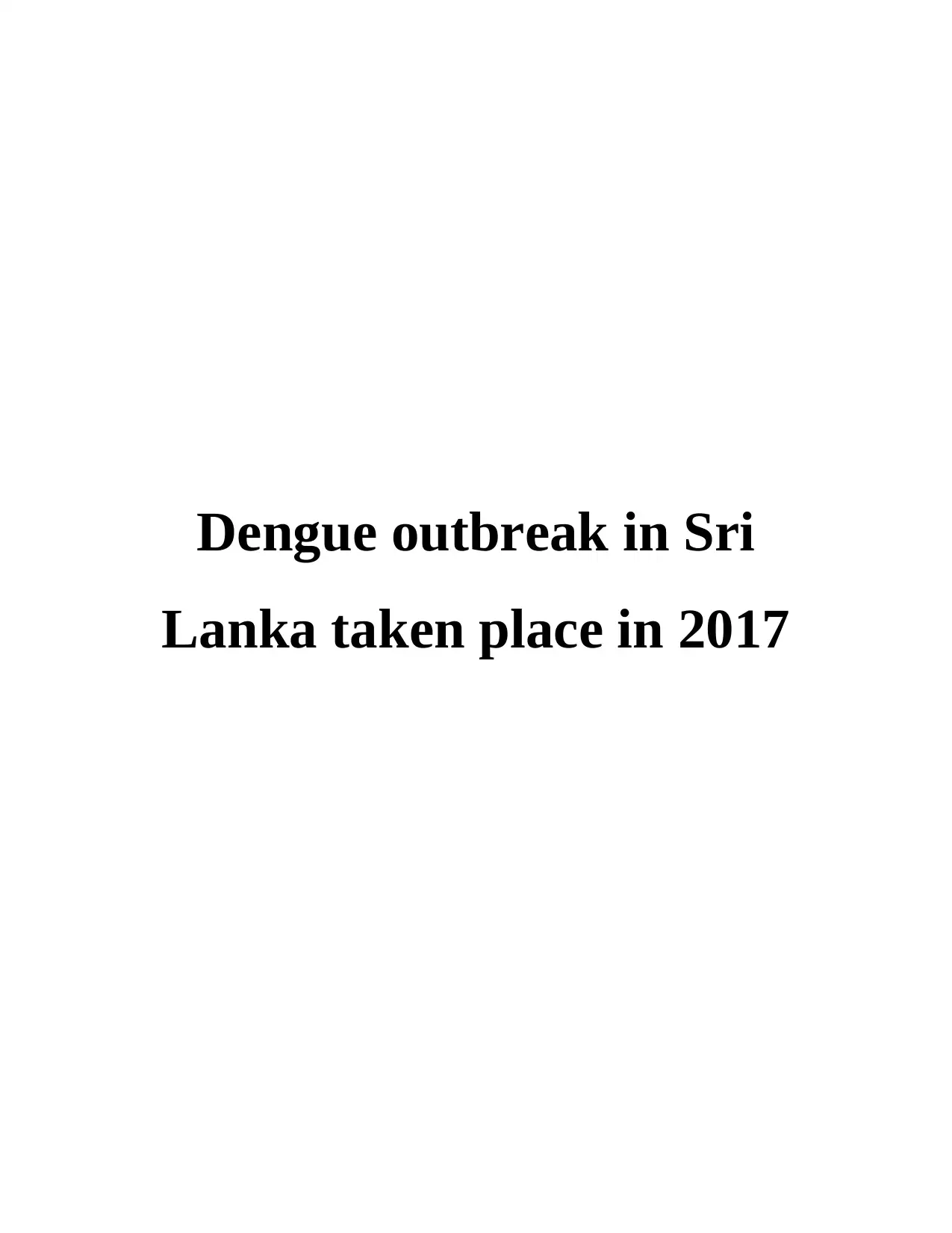
Dengue outbreak in Sri
Lanka taken place in 2017
Lanka taken place in 2017
Secure Best Marks with AI Grader
Need help grading? Try our AI Grader for instant feedback on your assignments.
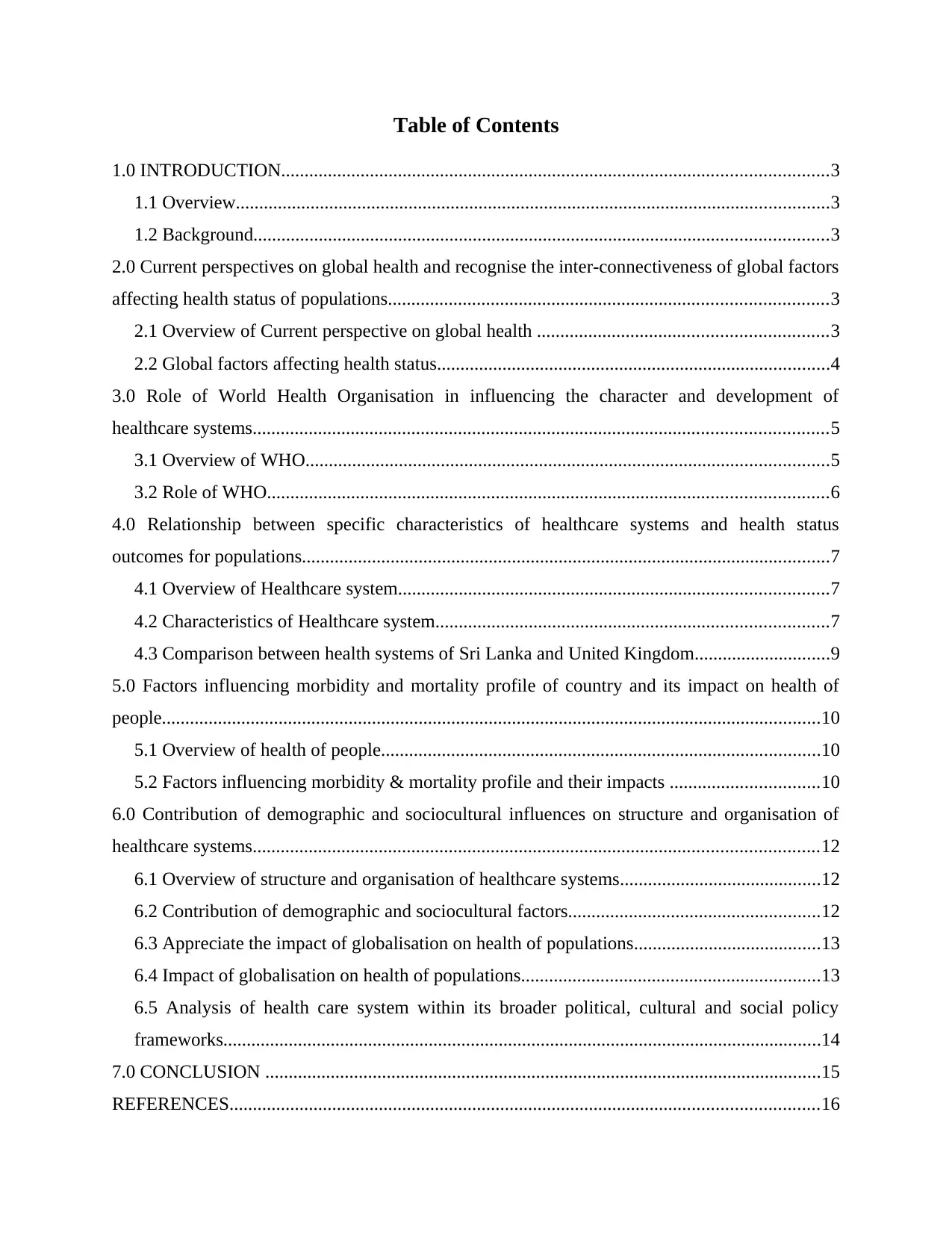
Table of Contents
1.0 INTRODUCTION.....................................................................................................................3
1.1 Overview...............................................................................................................................3
1.2 Background...........................................................................................................................3
2.0 Current perspectives on global health and recognise the inter-connectiveness of global factors
affecting health status of populations..............................................................................................3
2.1 Overview of Current perspective on global health ..............................................................3
2.2 Global factors affecting health status....................................................................................4
3.0 Role of World Health Organisation in influencing the character and development of
healthcare systems...........................................................................................................................5
3.1 Overview of WHO................................................................................................................5
3.2 Role of WHO........................................................................................................................6
4.0 Relationship between specific characteristics of healthcare systems and health status
outcomes for populations.................................................................................................................7
4.1 Overview of Healthcare system............................................................................................7
4.2 Characteristics of Healthcare system....................................................................................7
4.3 Comparison between health systems of Sri Lanka and United Kingdom.............................9
5.0 Factors influencing morbidity and mortality profile of country and its impact on health of
people.............................................................................................................................................10
5.1 Overview of health of people..............................................................................................10
5.2 Factors influencing morbidity & mortality profile and their impacts ................................10
6.0 Contribution of demographic and sociocultural influences on structure and organisation of
healthcare systems.........................................................................................................................12
6.1 Overview of structure and organisation of healthcare systems...........................................12
6.2 Contribution of demographic and sociocultural factors......................................................12
6.3 Appreciate the impact of globalisation on health of populations........................................13
6.4 Impact of globalisation on health of populations................................................................13
6.5 Analysis of health care system within its broader political, cultural and social policy
frameworks................................................................................................................................14
7.0 CONCLUSION .......................................................................................................................15
REFERENCES..............................................................................................................................16
1.0 INTRODUCTION.....................................................................................................................3
1.1 Overview...............................................................................................................................3
1.2 Background...........................................................................................................................3
2.0 Current perspectives on global health and recognise the inter-connectiveness of global factors
affecting health status of populations..............................................................................................3
2.1 Overview of Current perspective on global health ..............................................................3
2.2 Global factors affecting health status....................................................................................4
3.0 Role of World Health Organisation in influencing the character and development of
healthcare systems...........................................................................................................................5
3.1 Overview of WHO................................................................................................................5
3.2 Role of WHO........................................................................................................................6
4.0 Relationship between specific characteristics of healthcare systems and health status
outcomes for populations.................................................................................................................7
4.1 Overview of Healthcare system............................................................................................7
4.2 Characteristics of Healthcare system....................................................................................7
4.3 Comparison between health systems of Sri Lanka and United Kingdom.............................9
5.0 Factors influencing morbidity and mortality profile of country and its impact on health of
people.............................................................................................................................................10
5.1 Overview of health of people..............................................................................................10
5.2 Factors influencing morbidity & mortality profile and their impacts ................................10
6.0 Contribution of demographic and sociocultural influences on structure and organisation of
healthcare systems.........................................................................................................................12
6.1 Overview of structure and organisation of healthcare systems...........................................12
6.2 Contribution of demographic and sociocultural factors......................................................12
6.3 Appreciate the impact of globalisation on health of populations........................................13
6.4 Impact of globalisation on health of populations................................................................13
6.5 Analysis of health care system within its broader political, cultural and social policy
frameworks................................................................................................................................14
7.0 CONCLUSION .......................................................................................................................15
REFERENCES..............................................................................................................................16
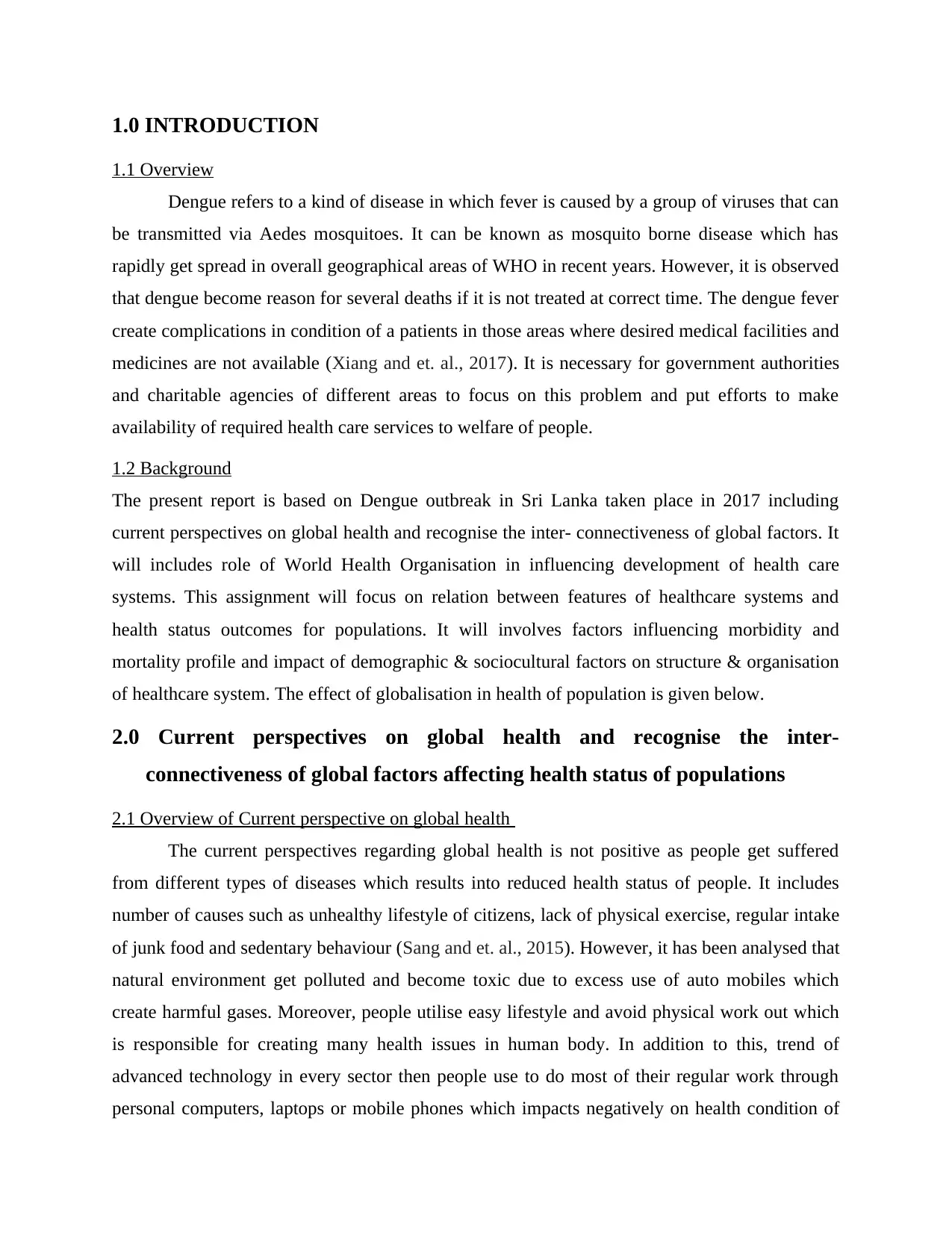
1.0 INTRODUCTION
1.1 Overview
Dengue refers to a kind of disease in which fever is caused by a group of viruses that can
be transmitted via Aedes mosquitoes. It can be known as mosquito borne disease which has
rapidly get spread in overall geographical areas of WHO in recent years. However, it is observed
that dengue become reason for several deaths if it is not treated at correct time. The dengue fever
create complications in condition of a patients in those areas where desired medical facilities and
medicines are not available (Xiang and et. al., 2017). It is necessary for government authorities
and charitable agencies of different areas to focus on this problem and put efforts to make
availability of required health care services to welfare of people.
1.2 Background
The present report is based on Dengue outbreak in Sri Lanka taken place in 2017 including
current perspectives on global health and recognise the inter- connectiveness of global factors. It
will includes role of World Health Organisation in influencing development of health care
systems. This assignment will focus on relation between features of healthcare systems and
health status outcomes for populations. It will involves factors influencing morbidity and
mortality profile and impact of demographic & sociocultural factors on structure & organisation
of healthcare system. The effect of globalisation in health of population is given below.
2.0 Current perspectives on global health and recognise the inter-
connectiveness of global factors affecting health status of populations
2.1 Overview of Current perspective on global health
The current perspectives regarding global health is not positive as people get suffered
from different types of diseases which results into reduced health status of people. It includes
number of causes such as unhealthy lifestyle of citizens, lack of physical exercise, regular intake
of junk food and sedentary behaviour (Sang and et. al., 2015). However, it has been analysed that
natural environment get polluted and become toxic due to excess use of auto mobiles which
create harmful gases. Moreover, people utilise easy lifestyle and avoid physical work out which
is responsible for creating many health issues in human body. In addition to this, trend of
advanced technology in every sector then people use to do most of their regular work through
personal computers, laptops or mobile phones which impacts negatively on health condition of
1.1 Overview
Dengue refers to a kind of disease in which fever is caused by a group of viruses that can
be transmitted via Aedes mosquitoes. It can be known as mosquito borne disease which has
rapidly get spread in overall geographical areas of WHO in recent years. However, it is observed
that dengue become reason for several deaths if it is not treated at correct time. The dengue fever
create complications in condition of a patients in those areas where desired medical facilities and
medicines are not available (Xiang and et. al., 2017). It is necessary for government authorities
and charitable agencies of different areas to focus on this problem and put efforts to make
availability of required health care services to welfare of people.
1.2 Background
The present report is based on Dengue outbreak in Sri Lanka taken place in 2017 including
current perspectives on global health and recognise the inter- connectiveness of global factors. It
will includes role of World Health Organisation in influencing development of health care
systems. This assignment will focus on relation between features of healthcare systems and
health status outcomes for populations. It will involves factors influencing morbidity and
mortality profile and impact of demographic & sociocultural factors on structure & organisation
of healthcare system. The effect of globalisation in health of population is given below.
2.0 Current perspectives on global health and recognise the inter-
connectiveness of global factors affecting health status of populations
2.1 Overview of Current perspective on global health
The current perspectives regarding global health is not positive as people get suffered
from different types of diseases which results into reduced health status of people. It includes
number of causes such as unhealthy lifestyle of citizens, lack of physical exercise, regular intake
of junk food and sedentary behaviour (Sang and et. al., 2015). However, it has been analysed that
natural environment get polluted and become toxic due to excess use of auto mobiles which
create harmful gases. Moreover, people utilise easy lifestyle and avoid physical work out which
is responsible for creating many health issues in human body. In addition to this, trend of
advanced technology in every sector then people use to do most of their regular work through
personal computers, laptops or mobile phones which impacts negatively on health condition of
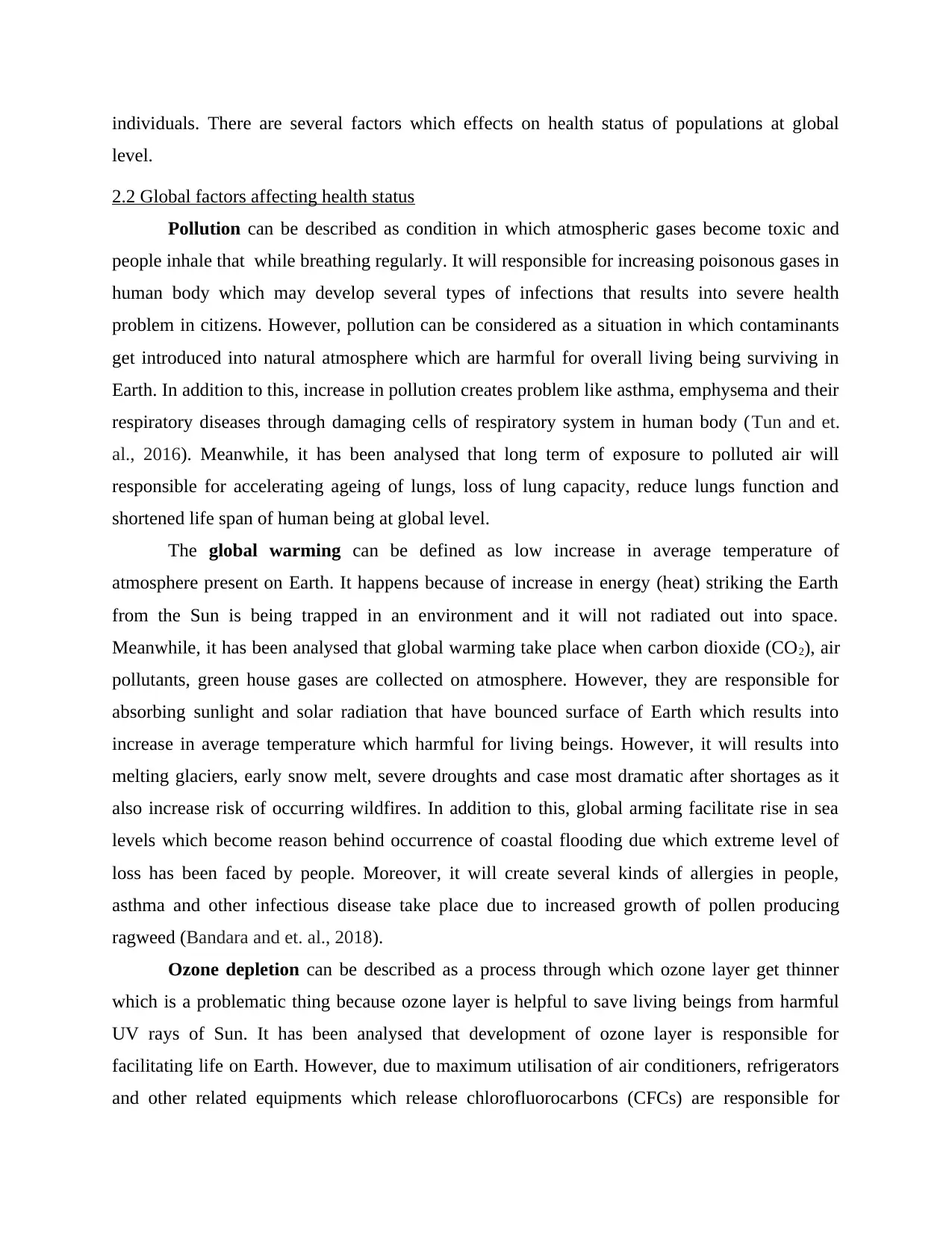
individuals. There are several factors which effects on health status of populations at global
level.
2.2 Global factors affecting health status
Pollution can be described as condition in which atmospheric gases become toxic and
people inhale that while breathing regularly. It will responsible for increasing poisonous gases in
human body which may develop several types of infections that results into severe health
problem in citizens. However, pollution can be considered as a situation in which contaminants
get introduced into natural atmosphere which are harmful for overall living being surviving in
Earth. In addition to this, increase in pollution creates problem like asthma, emphysema and their
respiratory diseases through damaging cells of respiratory system in human body (Tun and et.
al., 2016). Meanwhile, it has been analysed that long term of exposure to polluted air will
responsible for accelerating ageing of lungs, loss of lung capacity, reduce lungs function and
shortened life span of human being at global level.
The global warming can be defined as low increase in average temperature of
atmosphere present on Earth. It happens because of increase in energy (heat) striking the Earth
from the Sun is being trapped in an environment and it will not radiated out into space.
Meanwhile, it has been analysed that global warming take place when carbon dioxide (CO2), air
pollutants, green house gases are collected on atmosphere. However, they are responsible for
absorbing sunlight and solar radiation that have bounced surface of Earth which results into
increase in average temperature which harmful for living beings. However, it will results into
melting glaciers, early snow melt, severe droughts and case most dramatic after shortages as it
also increase risk of occurring wildfires. In addition to this, global arming facilitate rise in sea
levels which become reason behind occurrence of coastal flooding due which extreme level of
loss has been faced by people. Moreover, it will create several kinds of allergies in people,
asthma and other infectious disease take place due to increased growth of pollen producing
ragweed (Bandara and et. al., 2018).
Ozone depletion can be described as a process through which ozone layer get thinner
which is a problematic thing because ozone layer is helpful to save living beings from harmful
UV rays of Sun. It has been analysed that development of ozone layer is responsible for
facilitating life on Earth. However, due to maximum utilisation of air conditioners, refrigerators
and other related equipments which release chlorofluorocarbons (CFCs) are responsible for
level.
2.2 Global factors affecting health status
Pollution can be described as condition in which atmospheric gases become toxic and
people inhale that while breathing regularly. It will responsible for increasing poisonous gases in
human body which may develop several types of infections that results into severe health
problem in citizens. However, pollution can be considered as a situation in which contaminants
get introduced into natural atmosphere which are harmful for overall living being surviving in
Earth. In addition to this, increase in pollution creates problem like asthma, emphysema and their
respiratory diseases through damaging cells of respiratory system in human body (Tun and et.
al., 2016). Meanwhile, it has been analysed that long term of exposure to polluted air will
responsible for accelerating ageing of lungs, loss of lung capacity, reduce lungs function and
shortened life span of human being at global level.
The global warming can be defined as low increase in average temperature of
atmosphere present on Earth. It happens because of increase in energy (heat) striking the Earth
from the Sun is being trapped in an environment and it will not radiated out into space.
Meanwhile, it has been analysed that global warming take place when carbon dioxide (CO2), air
pollutants, green house gases are collected on atmosphere. However, they are responsible for
absorbing sunlight and solar radiation that have bounced surface of Earth which results into
increase in average temperature which harmful for living beings. However, it will results into
melting glaciers, early snow melt, severe droughts and case most dramatic after shortages as it
also increase risk of occurring wildfires. In addition to this, global arming facilitate rise in sea
levels which become reason behind occurrence of coastal flooding due which extreme level of
loss has been faced by people. Moreover, it will create several kinds of allergies in people,
asthma and other infectious disease take place due to increased growth of pollen producing
ragweed (Bandara and et. al., 2018).
Ozone depletion can be described as a process through which ozone layer get thinner
which is a problematic thing because ozone layer is helpful to save living beings from harmful
UV rays of Sun. It has been analysed that development of ozone layer is responsible for
facilitating life on Earth. However, due to maximum utilisation of air conditioners, refrigerators
and other related equipments which release chlorofluorocarbons (CFCs) are responsible for
Secure Best Marks with AI Grader
Need help grading? Try our AI Grader for instant feedback on your assignments.
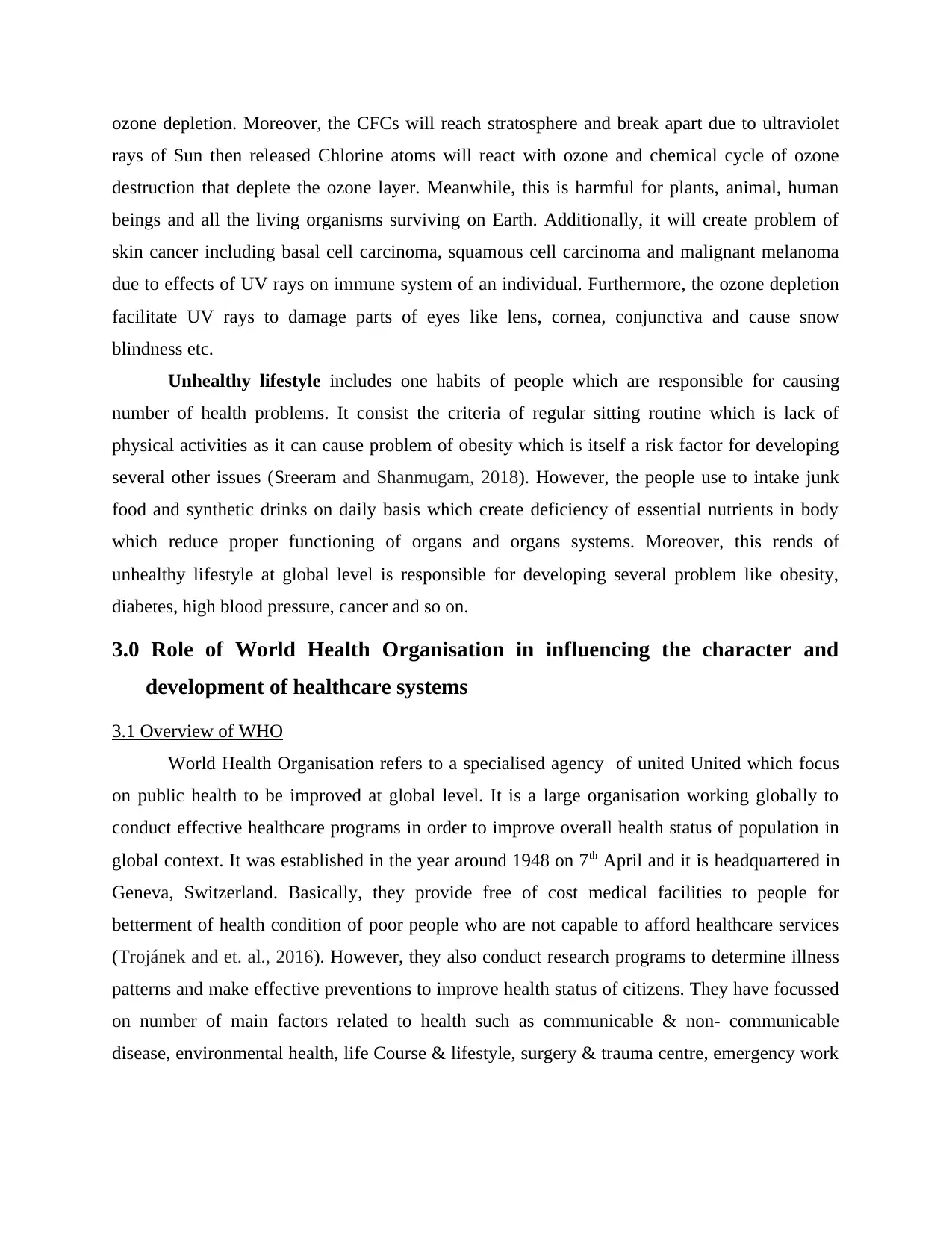
ozone depletion. Moreover, the CFCs will reach stratosphere and break apart due to ultraviolet
rays of Sun then released Chlorine atoms will react with ozone and chemical cycle of ozone
destruction that deplete the ozone layer. Meanwhile, this is harmful for plants, animal, human
beings and all the living organisms surviving on Earth. Additionally, it will create problem of
skin cancer including basal cell carcinoma, squamous cell carcinoma and malignant melanoma
due to effects of UV rays on immune system of an individual. Furthermore, the ozone depletion
facilitate UV rays to damage parts of eyes like lens, cornea, conjunctiva and cause snow
blindness etc.
Unhealthy lifestyle includes one habits of people which are responsible for causing
number of health problems. It consist the criteria of regular sitting routine which is lack of
physical activities as it can cause problem of obesity which is itself a risk factor for developing
several other issues (Sreeram and Shanmugam, 2018). However, the people use to intake junk
food and synthetic drinks on daily basis which create deficiency of essential nutrients in body
which reduce proper functioning of organs and organs systems. Moreover, this rends of
unhealthy lifestyle at global level is responsible for developing several problem like obesity,
diabetes, high blood pressure, cancer and so on.
3.0 Role of World Health Organisation in influencing the character and
development of healthcare systems
3.1 Overview of WHO
World Health Organisation refers to a specialised agency of united United which focus
on public health to be improved at global level. It is a large organisation working globally to
conduct effective healthcare programs in order to improve overall health status of population in
global context. It was established in the year around 1948 on 7th April and it is headquartered in
Geneva, Switzerland. Basically, they provide free of cost medical facilities to people for
betterment of health condition of poor people who are not capable to afford healthcare services
(Trojánek and et. al., 2016). However, they also conduct research programs to determine illness
patterns and make effective preventions to improve health status of citizens. They have focussed
on number of main factors related to health such as communicable & non- communicable
disease, environmental health, life Course & lifestyle, surgery & trauma centre, emergency work
rays of Sun then released Chlorine atoms will react with ozone and chemical cycle of ozone
destruction that deplete the ozone layer. Meanwhile, this is harmful for plants, animal, human
beings and all the living organisms surviving on Earth. Additionally, it will create problem of
skin cancer including basal cell carcinoma, squamous cell carcinoma and malignant melanoma
due to effects of UV rays on immune system of an individual. Furthermore, the ozone depletion
facilitate UV rays to damage parts of eyes like lens, cornea, conjunctiva and cause snow
blindness etc.
Unhealthy lifestyle includes one habits of people which are responsible for causing
number of health problems. It consist the criteria of regular sitting routine which is lack of
physical activities as it can cause problem of obesity which is itself a risk factor for developing
several other issues (Sreeram and Shanmugam, 2018). However, the people use to intake junk
food and synthetic drinks on daily basis which create deficiency of essential nutrients in body
which reduce proper functioning of organs and organs systems. Moreover, this rends of
unhealthy lifestyle at global level is responsible for developing several problem like obesity,
diabetes, high blood pressure, cancer and so on.
3.0 Role of World Health Organisation in influencing the character and
development of healthcare systems
3.1 Overview of WHO
World Health Organisation refers to a specialised agency of united United which focus
on public health to be improved at global level. It is a large organisation working globally to
conduct effective healthcare programs in order to improve overall health status of population in
global context. It was established in the year around 1948 on 7th April and it is headquartered in
Geneva, Switzerland. Basically, they provide free of cost medical facilities to people for
betterment of health condition of poor people who are not capable to afford healthcare services
(Trojánek and et. al., 2016). However, they also conduct research programs to determine illness
patterns and make effective preventions to improve health status of citizens. They have focussed
on number of main factors related to health such as communicable & non- communicable
disease, environmental health, life Course & lifestyle, surgery & trauma centre, emergency work
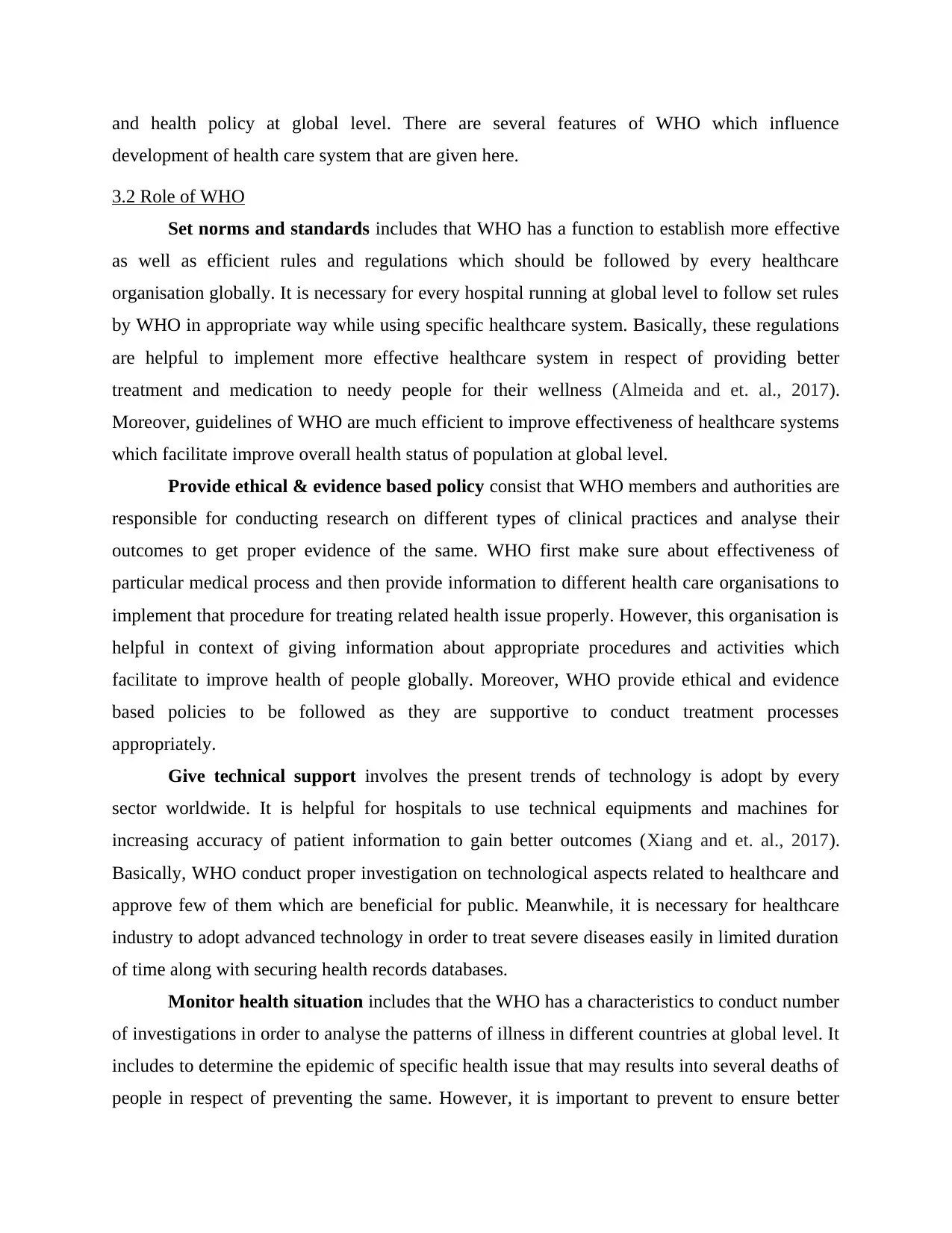
and health policy at global level. There are several features of WHO which influence
development of health care system that are given here.
3.2 Role of WHO
Set norms and standards includes that WHO has a function to establish more effective
as well as efficient rules and regulations which should be followed by every healthcare
organisation globally. It is necessary for every hospital running at global level to follow set rules
by WHO in appropriate way while using specific healthcare system. Basically, these regulations
are helpful to implement more effective healthcare system in respect of providing better
treatment and medication to needy people for their wellness (Almeida and et. al., 2017).
Moreover, guidelines of WHO are much efficient to improve effectiveness of healthcare systems
which facilitate improve overall health status of population at global level.
Provide ethical & evidence based policy consist that WHO members and authorities are
responsible for conducting research on different types of clinical practices and analyse their
outcomes to get proper evidence of the same. WHO first make sure about effectiveness of
particular medical process and then provide information to different health care organisations to
implement that procedure for treating related health issue properly. However, this organisation is
helpful in context of giving information about appropriate procedures and activities which
facilitate to improve health of people globally. Moreover, WHO provide ethical and evidence
based policies to be followed as they are supportive to conduct treatment processes
appropriately.
Give technical support involves the present trends of technology is adopt by every
sector worldwide. It is helpful for hospitals to use technical equipments and machines for
increasing accuracy of patient information to gain better outcomes (Xiang and et. al., 2017).
Basically, WHO conduct proper investigation on technological aspects related to healthcare and
approve few of them which are beneficial for public. Meanwhile, it is necessary for healthcare
industry to adopt advanced technology in order to treat severe diseases easily in limited duration
of time along with securing health records databases.
Monitor health situation includes that the WHO has a characteristics to conduct number
of investigations in order to analyse the patterns of illness in different countries at global level. It
includes to determine the epidemic of specific health issue that may results into several deaths of
people in respect of preventing the same. However, it is important to prevent to ensure better
development of health care system that are given here.
3.2 Role of WHO
Set norms and standards includes that WHO has a function to establish more effective
as well as efficient rules and regulations which should be followed by every healthcare
organisation globally. It is necessary for every hospital running at global level to follow set rules
by WHO in appropriate way while using specific healthcare system. Basically, these regulations
are helpful to implement more effective healthcare system in respect of providing better
treatment and medication to needy people for their wellness (Almeida and et. al., 2017).
Moreover, guidelines of WHO are much efficient to improve effectiveness of healthcare systems
which facilitate improve overall health status of population at global level.
Provide ethical & evidence based policy consist that WHO members and authorities are
responsible for conducting research on different types of clinical practices and analyse their
outcomes to get proper evidence of the same. WHO first make sure about effectiveness of
particular medical process and then provide information to different health care organisations to
implement that procedure for treating related health issue properly. However, this organisation is
helpful in context of giving information about appropriate procedures and activities which
facilitate to improve health of people globally. Moreover, WHO provide ethical and evidence
based policies to be followed as they are supportive to conduct treatment processes
appropriately.
Give technical support involves the present trends of technology is adopt by every
sector worldwide. It is helpful for hospitals to use technical equipments and machines for
increasing accuracy of patient information to gain better outcomes (Xiang and et. al., 2017).
Basically, WHO conduct proper investigation on technological aspects related to healthcare and
approve few of them which are beneficial for public. Meanwhile, it is necessary for healthcare
industry to adopt advanced technology in order to treat severe diseases easily in limited duration
of time along with securing health records databases.
Monitor health situation includes that the WHO has a characteristics to conduct number
of investigations in order to analyse the patterns of illness in different countries at global level. It
includes to determine the epidemic of specific health issue that may results into several deaths of
people in respect of preventing the same. However, it is important to prevent to ensure better
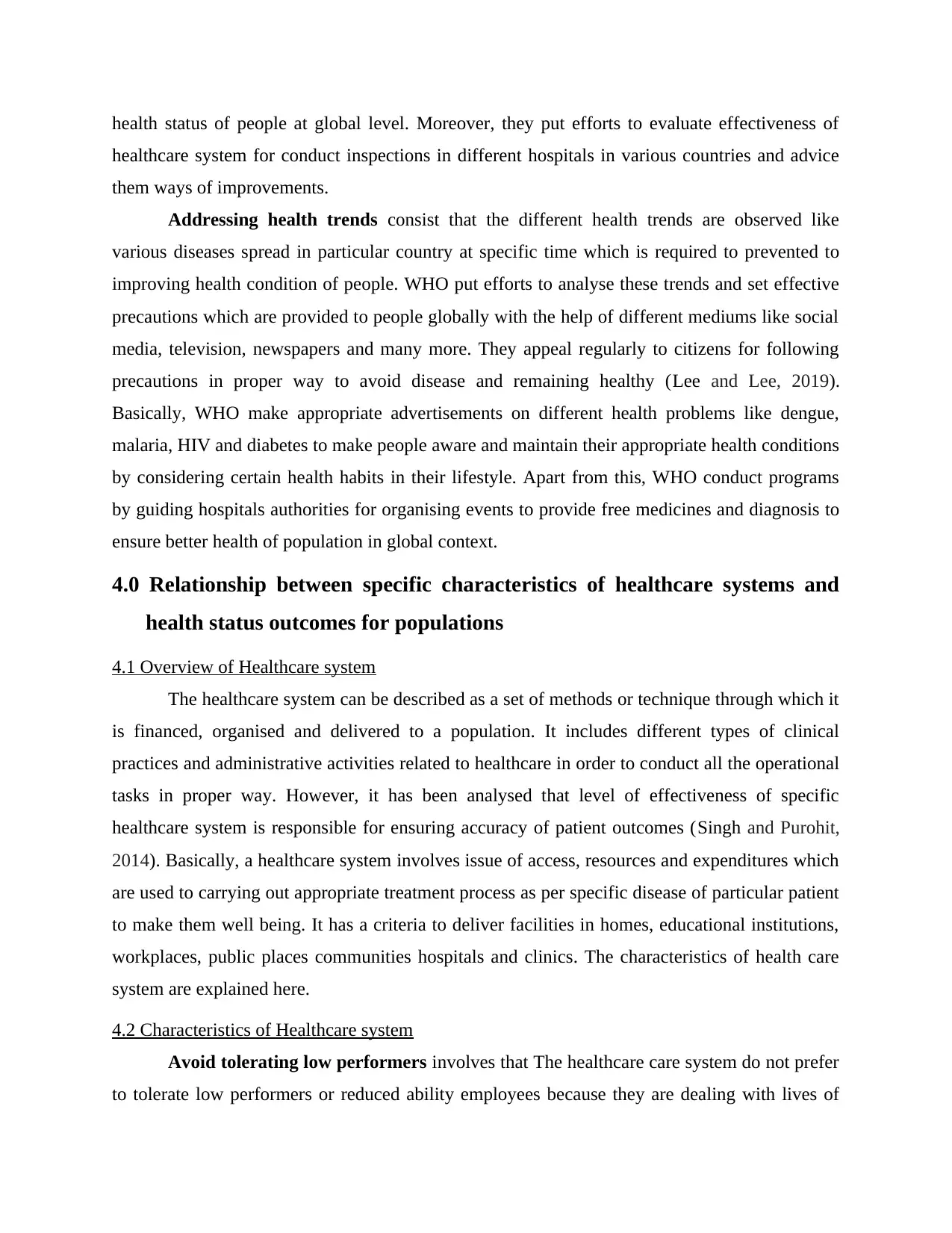
health status of people at global level. Moreover, they put efforts to evaluate effectiveness of
healthcare system for conduct inspections in different hospitals in various countries and advice
them ways of improvements.
Addressing health trends consist that the different health trends are observed like
various diseases spread in particular country at specific time which is required to prevented to
improving health condition of people. WHO put efforts to analyse these trends and set effective
precautions which are provided to people globally with the help of different mediums like social
media, television, newspapers and many more. They appeal regularly to citizens for following
precautions in proper way to avoid disease and remaining healthy (Lee and Lee, 2019).
Basically, WHO make appropriate advertisements on different health problems like dengue,
malaria, HIV and diabetes to make people aware and maintain their appropriate health conditions
by considering certain health habits in their lifestyle. Apart from this, WHO conduct programs
by guiding hospitals authorities for organising events to provide free medicines and diagnosis to
ensure better health of population in global context.
4.0 Relationship between specific characteristics of healthcare systems and
health status outcomes for populations
4.1 Overview of Healthcare system
The healthcare system can be described as a set of methods or technique through which it
is financed, organised and delivered to a population. It includes different types of clinical
practices and administrative activities related to healthcare in order to conduct all the operational
tasks in proper way. However, it has been analysed that level of effectiveness of specific
healthcare system is responsible for ensuring accuracy of patient outcomes (Singh and Purohit,
2014). Basically, a healthcare system involves issue of access, resources and expenditures which
are used to carrying out appropriate treatment process as per specific disease of particular patient
to make them well being. It has a criteria to deliver facilities in homes, educational institutions,
workplaces, public places communities hospitals and clinics. The characteristics of health care
system are explained here.
4.2 Characteristics of Healthcare system
Avoid tolerating low performers involves that The healthcare care system do not prefer
to tolerate low performers or reduced ability employees because they are dealing with lives of
healthcare system for conduct inspections in different hospitals in various countries and advice
them ways of improvements.
Addressing health trends consist that the different health trends are observed like
various diseases spread in particular country at specific time which is required to prevented to
improving health condition of people. WHO put efforts to analyse these trends and set effective
precautions which are provided to people globally with the help of different mediums like social
media, television, newspapers and many more. They appeal regularly to citizens for following
precautions in proper way to avoid disease and remaining healthy (Lee and Lee, 2019).
Basically, WHO make appropriate advertisements on different health problems like dengue,
malaria, HIV and diabetes to make people aware and maintain their appropriate health conditions
by considering certain health habits in their lifestyle. Apart from this, WHO conduct programs
by guiding hospitals authorities for organising events to provide free medicines and diagnosis to
ensure better health of population in global context.
4.0 Relationship between specific characteristics of healthcare systems and
health status outcomes for populations
4.1 Overview of Healthcare system
The healthcare system can be described as a set of methods or technique through which it
is financed, organised and delivered to a population. It includes different types of clinical
practices and administrative activities related to healthcare in order to conduct all the operational
tasks in proper way. However, it has been analysed that level of effectiveness of specific
healthcare system is responsible for ensuring accuracy of patient outcomes (Singh and Purohit,
2014). Basically, a healthcare system involves issue of access, resources and expenditures which
are used to carrying out appropriate treatment process as per specific disease of particular patient
to make them well being. It has a criteria to deliver facilities in homes, educational institutions,
workplaces, public places communities hospitals and clinics. The characteristics of health care
system are explained here.
4.2 Characteristics of Healthcare system
Avoid tolerating low performers involves that The healthcare care system do not prefer
to tolerate low performers or reduced ability employees because they are dealing with lives of
Paraphrase This Document
Need a fresh take? Get an instant paraphrase of this document with our AI Paraphraser
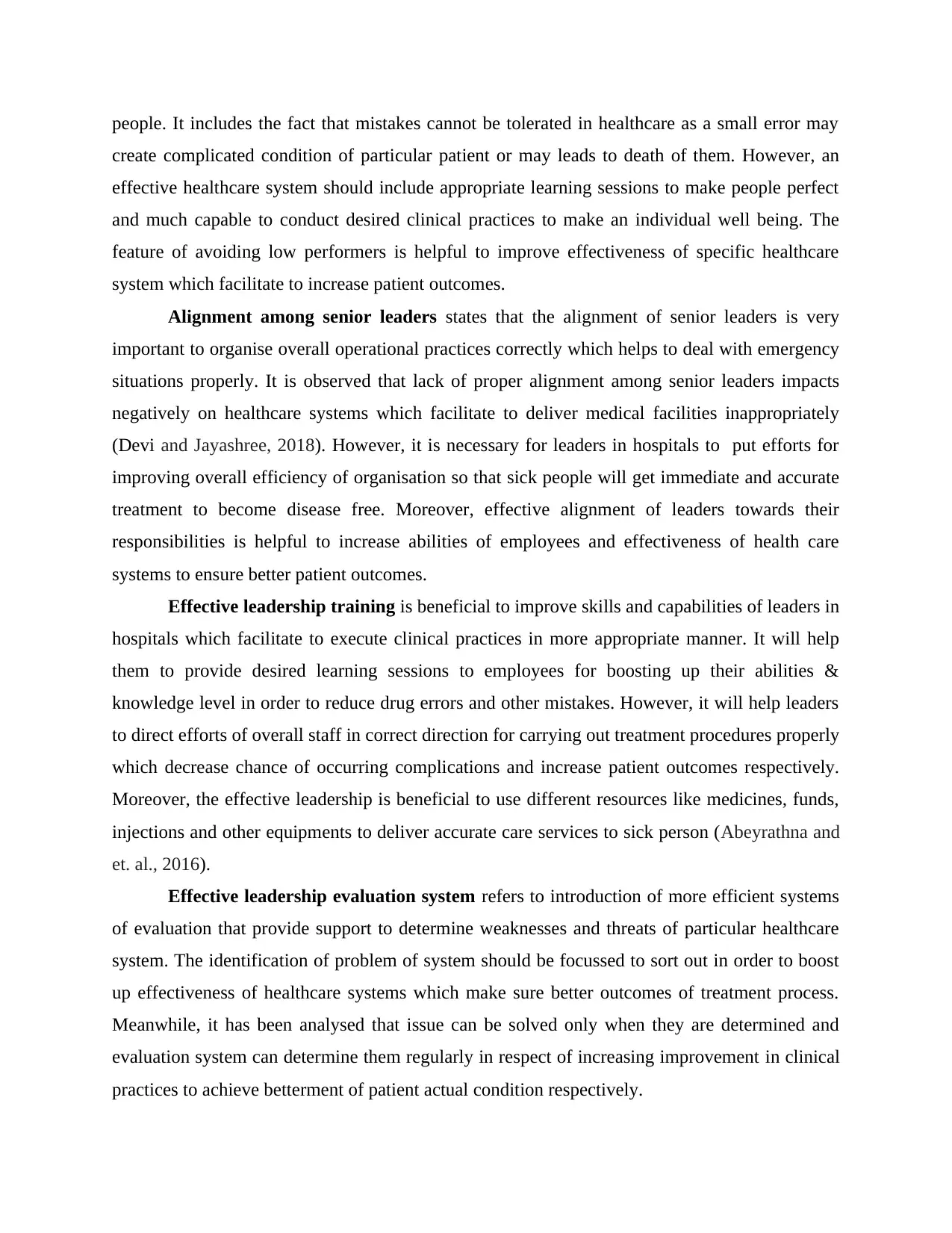
people. It includes the fact that mistakes cannot be tolerated in healthcare as a small error may
create complicated condition of particular patient or may leads to death of them. However, an
effective healthcare system should include appropriate learning sessions to make people perfect
and much capable to conduct desired clinical practices to make an individual well being. The
feature of avoiding low performers is helpful to improve effectiveness of specific healthcare
system which facilitate to increase patient outcomes.
Alignment among senior leaders states that the alignment of senior leaders is very
important to organise overall operational practices correctly which helps to deal with emergency
situations properly. It is observed that lack of proper alignment among senior leaders impacts
negatively on healthcare systems which facilitate to deliver medical facilities inappropriately
(Devi and Jayashree, 2018). However, it is necessary for leaders in hospitals to put efforts for
improving overall efficiency of organisation so that sick people will get immediate and accurate
treatment to become disease free. Moreover, effective alignment of leaders towards their
responsibilities is helpful to increase abilities of employees and effectiveness of health care
systems to ensure better patient outcomes.
Effective leadership training is beneficial to improve skills and capabilities of leaders in
hospitals which facilitate to execute clinical practices in more appropriate manner. It will help
them to provide desired learning sessions to employees for boosting up their abilities &
knowledge level in order to reduce drug errors and other mistakes. However, it will help leaders
to direct efforts of overall staff in correct direction for carrying out treatment procedures properly
which decrease chance of occurring complications and increase patient outcomes respectively.
Moreover, the effective leadership is beneficial to use different resources like medicines, funds,
injections and other equipments to deliver accurate care services to sick person (Abeyrathna and
et. al., 2016).
Effective leadership evaluation system refers to introduction of more efficient systems
of evaluation that provide support to determine weaknesses and threats of particular healthcare
system. The identification of problem of system should be focussed to sort out in order to boost
up effectiveness of healthcare systems which make sure better outcomes of treatment process.
Meanwhile, it has been analysed that issue can be solved only when they are determined and
evaluation system can determine them regularly in respect of increasing improvement in clinical
practices to achieve betterment of patient actual condition respectively.
create complicated condition of particular patient or may leads to death of them. However, an
effective healthcare system should include appropriate learning sessions to make people perfect
and much capable to conduct desired clinical practices to make an individual well being. The
feature of avoiding low performers is helpful to improve effectiveness of specific healthcare
system which facilitate to increase patient outcomes.
Alignment among senior leaders states that the alignment of senior leaders is very
important to organise overall operational practices correctly which helps to deal with emergency
situations properly. It is observed that lack of proper alignment among senior leaders impacts
negatively on healthcare systems which facilitate to deliver medical facilities inappropriately
(Devi and Jayashree, 2018). However, it is necessary for leaders in hospitals to put efforts for
improving overall efficiency of organisation so that sick people will get immediate and accurate
treatment to become disease free. Moreover, effective alignment of leaders towards their
responsibilities is helpful to increase abilities of employees and effectiveness of health care
systems to ensure better patient outcomes.
Effective leadership training is beneficial to improve skills and capabilities of leaders in
hospitals which facilitate to execute clinical practices in more appropriate manner. It will help
them to provide desired learning sessions to employees for boosting up their abilities &
knowledge level in order to reduce drug errors and other mistakes. However, it will help leaders
to direct efforts of overall staff in correct direction for carrying out treatment procedures properly
which decrease chance of occurring complications and increase patient outcomes respectively.
Moreover, the effective leadership is beneficial to use different resources like medicines, funds,
injections and other equipments to deliver accurate care services to sick person (Abeyrathna and
et. al., 2016).
Effective leadership evaluation system refers to introduction of more efficient systems
of evaluation that provide support to determine weaknesses and threats of particular healthcare
system. The identification of problem of system should be focussed to sort out in order to boost
up effectiveness of healthcare systems which make sure better outcomes of treatment process.
Meanwhile, it has been analysed that issue can be solved only when they are determined and
evaluation system can determine them regularly in respect of increasing improvement in clinical
practices to achieve betterment of patient actual condition respectively.
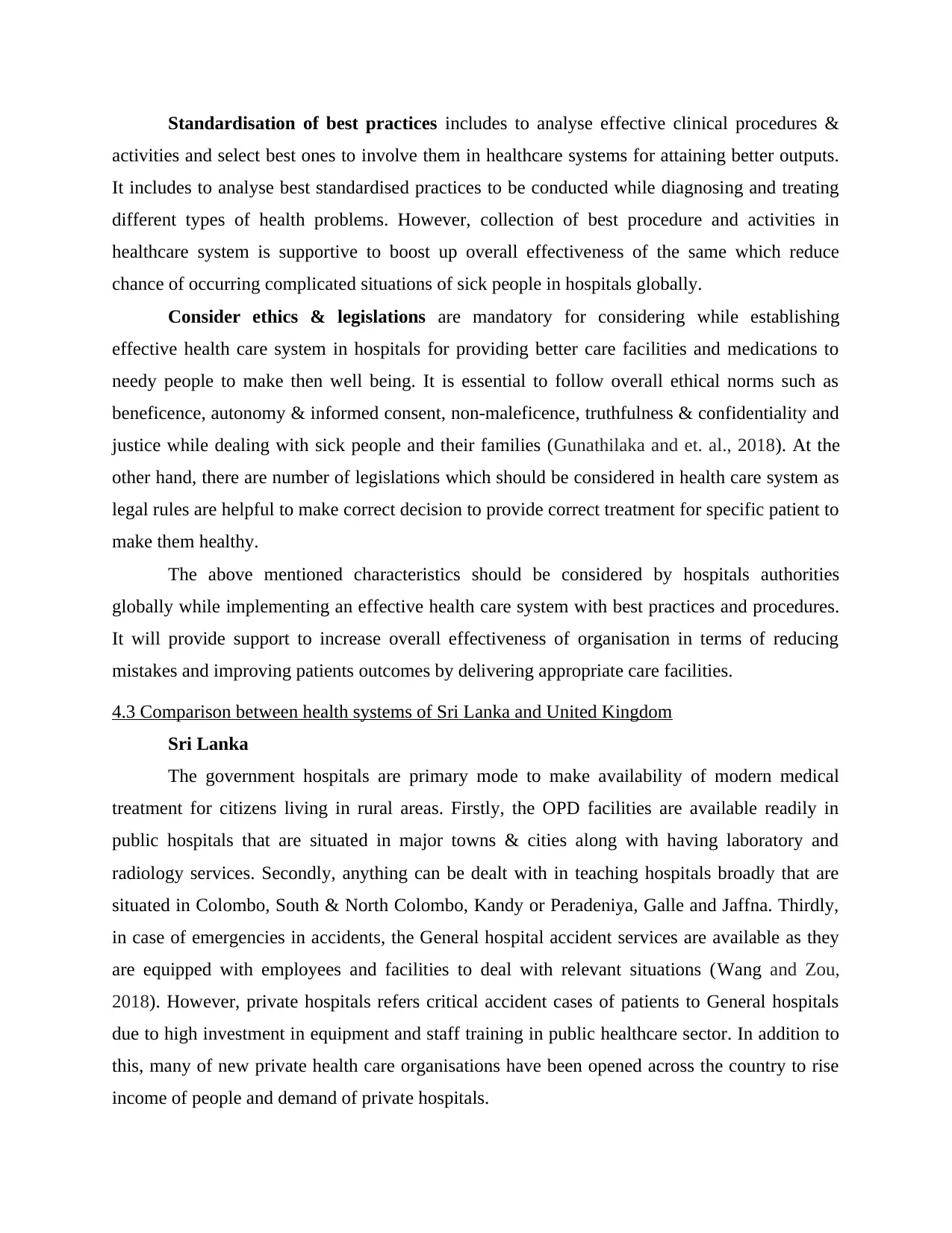
Standardisation of best practices includes to analyse effective clinical procedures &
activities and select best ones to involve them in healthcare systems for attaining better outputs.
It includes to analyse best standardised practices to be conducted while diagnosing and treating
different types of health problems. However, collection of best procedure and activities in
healthcare system is supportive to boost up overall effectiveness of the same which reduce
chance of occurring complicated situations of sick people in hospitals globally.
Consider ethics & legislations are mandatory for considering while establishing
effective health care system in hospitals for providing better care facilities and medications to
needy people to make then well being. It is essential to follow overall ethical norms such as
beneficence, autonomy & informed consent, non-maleficence, truthfulness & confidentiality and
justice while dealing with sick people and their families (Gunathilaka and et. al., 2018). At the
other hand, there are number of legislations which should be considered in health care system as
legal rules are helpful to make correct decision to provide correct treatment for specific patient to
make them healthy.
The above mentioned characteristics should be considered by hospitals authorities
globally while implementing an effective health care system with best practices and procedures.
It will provide support to increase overall effectiveness of organisation in terms of reducing
mistakes and improving patients outcomes by delivering appropriate care facilities.
4.3 Comparison between health systems of Sri Lanka and United Kingdom
Sri Lanka
The government hospitals are primary mode to make availability of modern medical
treatment for citizens living in rural areas. Firstly, the OPD facilities are available readily in
public hospitals that are situated in major towns & cities along with having laboratory and
radiology services. Secondly, anything can be dealt with in teaching hospitals broadly that are
situated in Colombo, South & North Colombo, Kandy or Peradeniya, Galle and Jaffna. Thirdly,
in case of emergencies in accidents, the General hospital accident services are available as they
are equipped with employees and facilities to deal with relevant situations (Wang and Zou,
2018). However, private hospitals refers critical accident cases of patients to General hospitals
due to high investment in equipment and staff training in public healthcare sector. In addition to
this, many of new private health care organisations have been opened across the country to rise
income of people and demand of private hospitals.
activities and select best ones to involve them in healthcare systems for attaining better outputs.
It includes to analyse best standardised practices to be conducted while diagnosing and treating
different types of health problems. However, collection of best procedure and activities in
healthcare system is supportive to boost up overall effectiveness of the same which reduce
chance of occurring complicated situations of sick people in hospitals globally.
Consider ethics & legislations are mandatory for considering while establishing
effective health care system in hospitals for providing better care facilities and medications to
needy people to make then well being. It is essential to follow overall ethical norms such as
beneficence, autonomy & informed consent, non-maleficence, truthfulness & confidentiality and
justice while dealing with sick people and their families (Gunathilaka and et. al., 2018). At the
other hand, there are number of legislations which should be considered in health care system as
legal rules are helpful to make correct decision to provide correct treatment for specific patient to
make them healthy.
The above mentioned characteristics should be considered by hospitals authorities
globally while implementing an effective health care system with best practices and procedures.
It will provide support to increase overall effectiveness of organisation in terms of reducing
mistakes and improving patients outcomes by delivering appropriate care facilities.
4.3 Comparison between health systems of Sri Lanka and United Kingdom
Sri Lanka
The government hospitals are primary mode to make availability of modern medical
treatment for citizens living in rural areas. Firstly, the OPD facilities are available readily in
public hospitals that are situated in major towns & cities along with having laboratory and
radiology services. Secondly, anything can be dealt with in teaching hospitals broadly that are
situated in Colombo, South & North Colombo, Kandy or Peradeniya, Galle and Jaffna. Thirdly,
in case of emergencies in accidents, the General hospital accident services are available as they
are equipped with employees and facilities to deal with relevant situations (Wang and Zou,
2018). However, private hospitals refers critical accident cases of patients to General hospitals
due to high investment in equipment and staff training in public healthcare sector. In addition to
this, many of new private health care organisations have been opened across the country to rise
income of people and demand of private hospitals.
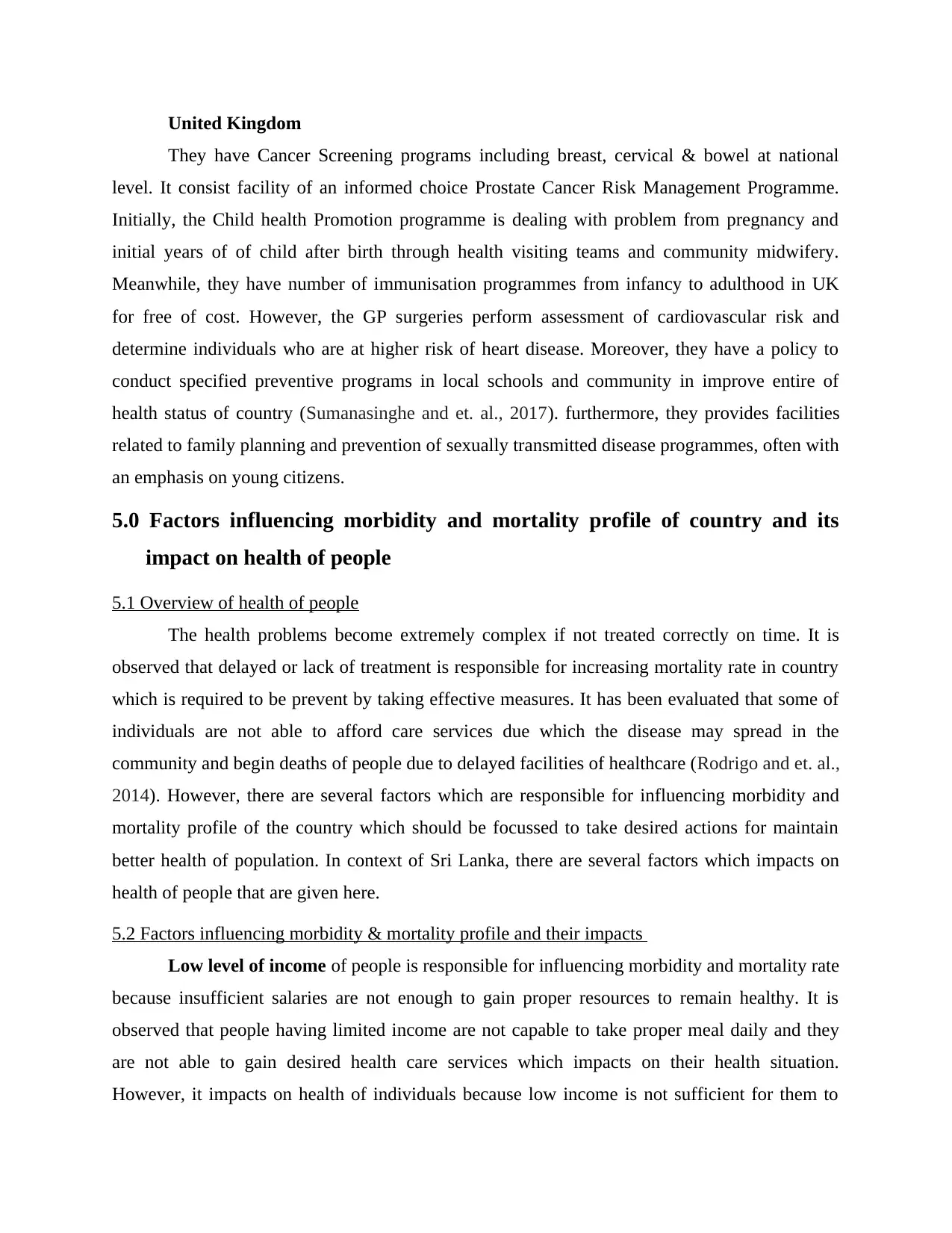
United Kingdom
They have Cancer Screening programs including breast, cervical & bowel at national
level. It consist facility of an informed choice Prostate Cancer Risk Management Programme.
Initially, the Child health Promotion programme is dealing with problem from pregnancy and
initial years of of child after birth through health visiting teams and community midwifery.
Meanwhile, they have number of immunisation programmes from infancy to adulthood in UK
for free of cost. However, the GP surgeries perform assessment of cardiovascular risk and
determine individuals who are at higher risk of heart disease. Moreover, they have a policy to
conduct specified preventive programs in local schools and community in improve entire of
health status of country (Sumanasinghe and et. al., 2017). furthermore, they provides facilities
related to family planning and prevention of sexually transmitted disease programmes, often with
an emphasis on young citizens.
5.0 Factors influencing morbidity and mortality profile of country and its
impact on health of people
5.1 Overview of health of people
The health problems become extremely complex if not treated correctly on time. It is
observed that delayed or lack of treatment is responsible for increasing mortality rate in country
which is required to be prevent by taking effective measures. It has been evaluated that some of
individuals are not able to afford care services due which the disease may spread in the
community and begin deaths of people due to delayed facilities of healthcare (Rodrigo and et. al.,
2014). However, there are several factors which are responsible for influencing morbidity and
mortality profile of the country which should be focussed to take desired actions for maintain
better health of population. In context of Sri Lanka, there are several factors which impacts on
health of people that are given here.
5.2 Factors influencing morbidity & mortality profile and their impacts
Low level of income of people is responsible for influencing morbidity and mortality rate
because insufficient salaries are not enough to gain proper resources to remain healthy. It is
observed that people having limited income are not capable to take proper meal daily and they
are not able to gain desired health care services which impacts on their health situation.
However, it impacts on health of individuals because low income is not sufficient for them to
They have Cancer Screening programs including breast, cervical & bowel at national
level. It consist facility of an informed choice Prostate Cancer Risk Management Programme.
Initially, the Child health Promotion programme is dealing with problem from pregnancy and
initial years of of child after birth through health visiting teams and community midwifery.
Meanwhile, they have number of immunisation programmes from infancy to adulthood in UK
for free of cost. However, the GP surgeries perform assessment of cardiovascular risk and
determine individuals who are at higher risk of heart disease. Moreover, they have a policy to
conduct specified preventive programs in local schools and community in improve entire of
health status of country (Sumanasinghe and et. al., 2017). furthermore, they provides facilities
related to family planning and prevention of sexually transmitted disease programmes, often with
an emphasis on young citizens.
5.0 Factors influencing morbidity and mortality profile of country and its
impact on health of people
5.1 Overview of health of people
The health problems become extremely complex if not treated correctly on time. It is
observed that delayed or lack of treatment is responsible for increasing mortality rate in country
which is required to be prevent by taking effective measures. It has been evaluated that some of
individuals are not able to afford care services due which the disease may spread in the
community and begin deaths of people due to delayed facilities of healthcare (Rodrigo and et. al.,
2014). However, there are several factors which are responsible for influencing morbidity and
mortality profile of the country which should be focussed to take desired actions for maintain
better health of population. In context of Sri Lanka, there are several factors which impacts on
health of people that are given here.
5.2 Factors influencing morbidity & mortality profile and their impacts
Low level of income of people is responsible for influencing morbidity and mortality rate
because insufficient salaries are not enough to gain proper resources to remain healthy. It is
observed that people having limited income are not capable to take proper meal daily and they
are not able to gain desired health care services which impacts on their health situation.
However, it impacts on health of individuals because low income is not sufficient for them to
Secure Best Marks with AI Grader
Need help grading? Try our AI Grader for instant feedback on your assignments.
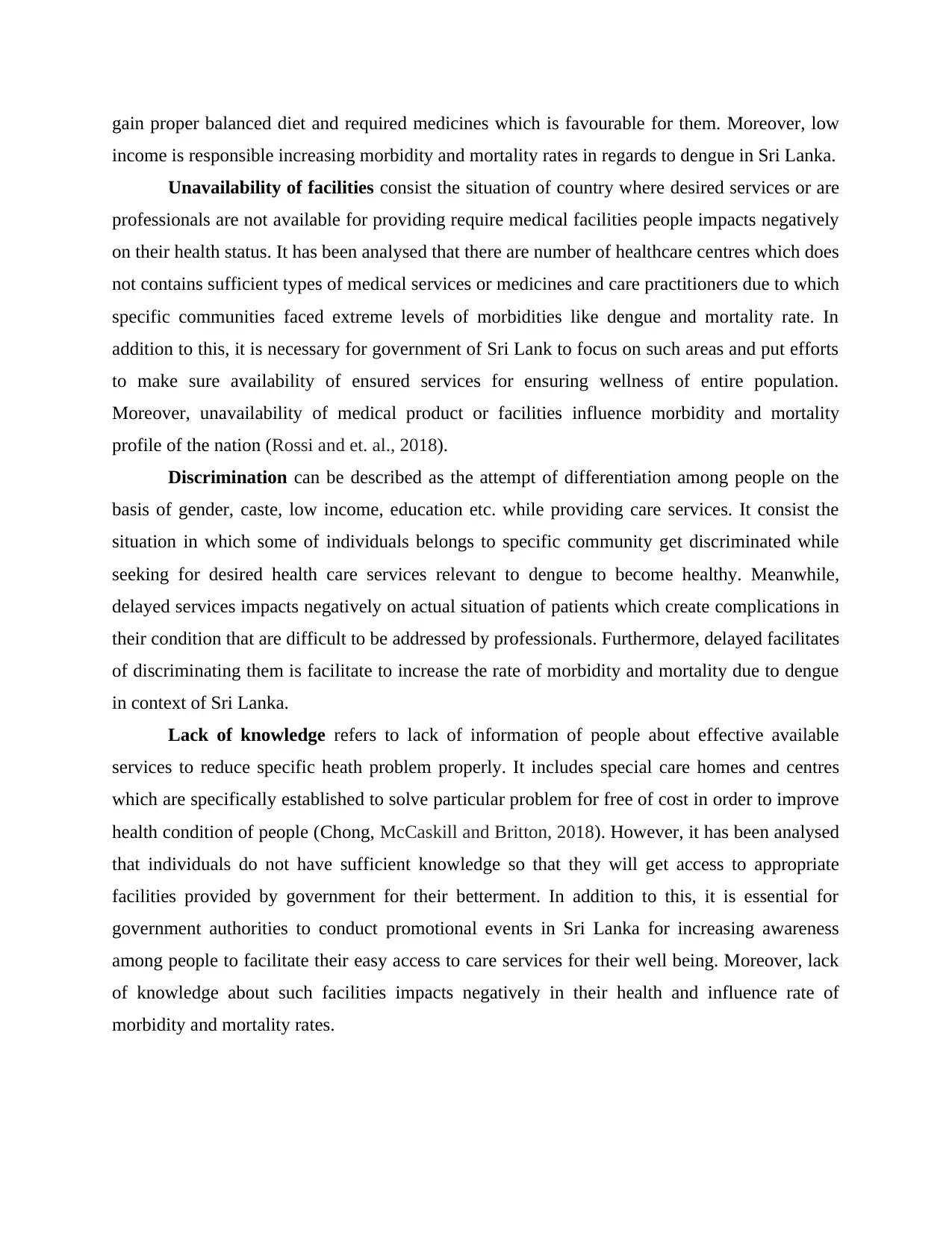
gain proper balanced diet and required medicines which is favourable for them. Moreover, low
income is responsible increasing morbidity and mortality rates in regards to dengue in Sri Lanka.
Unavailability of facilities consist the situation of country where desired services or are
professionals are not available for providing require medical facilities people impacts negatively
on their health status. It has been analysed that there are number of healthcare centres which does
not contains sufficient types of medical services or medicines and care practitioners due to which
specific communities faced extreme levels of morbidities like dengue and mortality rate. In
addition to this, it is necessary for government of Sri Lank to focus on such areas and put efforts
to make sure availability of ensured services for ensuring wellness of entire population.
Moreover, unavailability of medical product or facilities influence morbidity and mortality
profile of the nation (Rossi and et. al., 2018).
Discrimination can be described as the attempt of differentiation among people on the
basis of gender, caste, low income, education etc. while providing care services. It consist the
situation in which some of individuals belongs to specific community get discriminated while
seeking for desired health care services relevant to dengue to become healthy. Meanwhile,
delayed services impacts negatively on actual situation of patients which create complications in
their condition that are difficult to be addressed by professionals. Furthermore, delayed facilitates
of discriminating them is facilitate to increase the rate of morbidity and mortality due to dengue
in context of Sri Lanka.
Lack of knowledge refers to lack of information of people about effective available
services to reduce specific heath problem properly. It includes special care homes and centres
which are specifically established to solve particular problem for free of cost in order to improve
health condition of people (Chong, McCaskill and Britton, 2018). However, it has been analysed
that individuals do not have sufficient knowledge so that they will get access to appropriate
facilities provided by government for their betterment. In addition to this, it is essential for
government authorities to conduct promotional events in Sri Lanka for increasing awareness
among people to facilitate their easy access to care services for their well being. Moreover, lack
of knowledge about such facilities impacts negatively in their health and influence rate of
morbidity and mortality rates.
income is responsible increasing morbidity and mortality rates in regards to dengue in Sri Lanka.
Unavailability of facilities consist the situation of country where desired services or are
professionals are not available for providing require medical facilities people impacts negatively
on their health status. It has been analysed that there are number of healthcare centres which does
not contains sufficient types of medical services or medicines and care practitioners due to which
specific communities faced extreme levels of morbidities like dengue and mortality rate. In
addition to this, it is necessary for government of Sri Lank to focus on such areas and put efforts
to make sure availability of ensured services for ensuring wellness of entire population.
Moreover, unavailability of medical product or facilities influence morbidity and mortality
profile of the nation (Rossi and et. al., 2018).
Discrimination can be described as the attempt of differentiation among people on the
basis of gender, caste, low income, education etc. while providing care services. It consist the
situation in which some of individuals belongs to specific community get discriminated while
seeking for desired health care services relevant to dengue to become healthy. Meanwhile,
delayed services impacts negatively on actual situation of patients which create complications in
their condition that are difficult to be addressed by professionals. Furthermore, delayed facilitates
of discriminating them is facilitate to increase the rate of morbidity and mortality due to dengue
in context of Sri Lanka.
Lack of knowledge refers to lack of information of people about effective available
services to reduce specific heath problem properly. It includes special care homes and centres
which are specifically established to solve particular problem for free of cost in order to improve
health condition of people (Chong, McCaskill and Britton, 2018). However, it has been analysed
that individuals do not have sufficient knowledge so that they will get access to appropriate
facilities provided by government for their betterment. In addition to this, it is essential for
government authorities to conduct promotional events in Sri Lanka for increasing awareness
among people to facilitate their easy access to care services for their well being. Moreover, lack
of knowledge about such facilities impacts negatively in their health and influence rate of
morbidity and mortality rates.
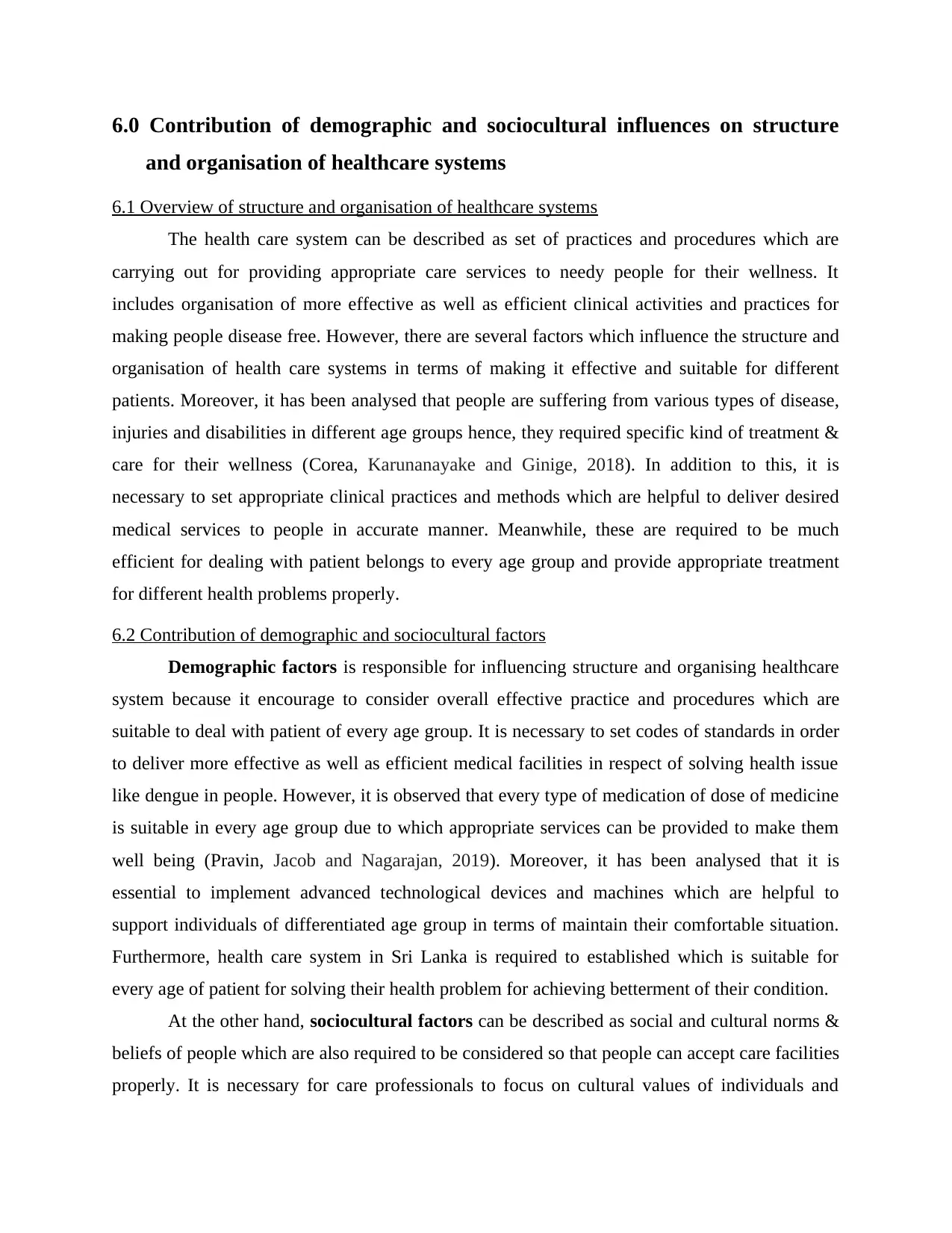
6.0 Contribution of demographic and sociocultural influences on structure
and organisation of healthcare systems
6.1 Overview of structure and organisation of healthcare systems
The health care system can be described as set of practices and procedures which are
carrying out for providing appropriate care services to needy people for their wellness. It
includes organisation of more effective as well as efficient clinical activities and practices for
making people disease free. However, there are several factors which influence the structure and
organisation of health care systems in terms of making it effective and suitable for different
patients. Moreover, it has been analysed that people are suffering from various types of disease,
injuries and disabilities in different age groups hence, they required specific kind of treatment &
care for their wellness (Corea, Karunanayake and Ginige, 2018). In addition to this, it is
necessary to set appropriate clinical practices and methods which are helpful to deliver desired
medical services to people in accurate manner. Meanwhile, these are required to be much
efficient for dealing with patient belongs to every age group and provide appropriate treatment
for different health problems properly.
6.2 Contribution of demographic and sociocultural factors
Demographic factors is responsible for influencing structure and organising healthcare
system because it encourage to consider overall effective practice and procedures which are
suitable to deal with patient of every age group. It is necessary to set codes of standards in order
to deliver more effective as well as efficient medical facilities in respect of solving health issue
like dengue in people. However, it is observed that every type of medication of dose of medicine
is suitable in every age group due to which appropriate services can be provided to make them
well being (Pravin, Jacob and Nagarajan, 2019). Moreover, it has been analysed that it is
essential to implement advanced technological devices and machines which are helpful to
support individuals of differentiated age group in terms of maintain their comfortable situation.
Furthermore, health care system in Sri Lanka is required to established which is suitable for
every age of patient for solving their health problem for achieving betterment of their condition.
At the other hand, sociocultural factors can be described as social and cultural norms &
beliefs of people which are also required to be considered so that people can accept care facilities
properly. It is necessary for care professionals to focus on cultural values of individuals and
and organisation of healthcare systems
6.1 Overview of structure and organisation of healthcare systems
The health care system can be described as set of practices and procedures which are
carrying out for providing appropriate care services to needy people for their wellness. It
includes organisation of more effective as well as efficient clinical activities and practices for
making people disease free. However, there are several factors which influence the structure and
organisation of health care systems in terms of making it effective and suitable for different
patients. Moreover, it has been analysed that people are suffering from various types of disease,
injuries and disabilities in different age groups hence, they required specific kind of treatment &
care for their wellness (Corea, Karunanayake and Ginige, 2018). In addition to this, it is
necessary to set appropriate clinical practices and methods which are helpful to deliver desired
medical services to people in accurate manner. Meanwhile, these are required to be much
efficient for dealing with patient belongs to every age group and provide appropriate treatment
for different health problems properly.
6.2 Contribution of demographic and sociocultural factors
Demographic factors is responsible for influencing structure and organising healthcare
system because it encourage to consider overall effective practice and procedures which are
suitable to deal with patient of every age group. It is necessary to set codes of standards in order
to deliver more effective as well as efficient medical facilities in respect of solving health issue
like dengue in people. However, it is observed that every type of medication of dose of medicine
is suitable in every age group due to which appropriate services can be provided to make them
well being (Pravin, Jacob and Nagarajan, 2019). Moreover, it has been analysed that it is
essential to implement advanced technological devices and machines which are helpful to
support individuals of differentiated age group in terms of maintain their comfortable situation.
Furthermore, health care system in Sri Lanka is required to established which is suitable for
every age of patient for solving their health problem for achieving betterment of their condition.
At the other hand, sociocultural factors can be described as social and cultural norms &
beliefs of people which are also required to be considered so that people can accept care facilities
properly. It is necessary for care professionals to focus on cultural values of individuals and
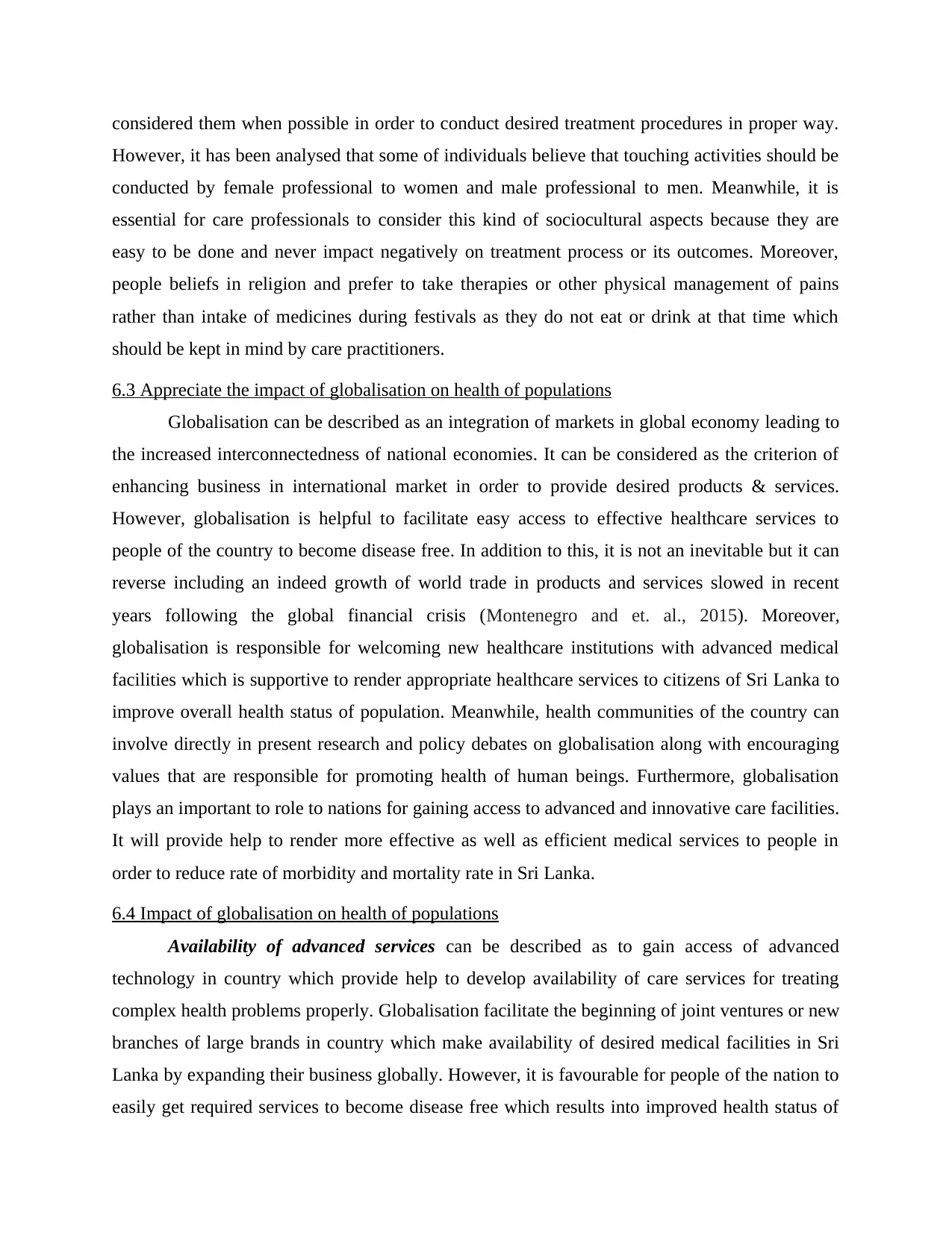
considered them when possible in order to conduct desired treatment procedures in proper way.
However, it has been analysed that some of individuals believe that touching activities should be
conducted by female professional to women and male professional to men. Meanwhile, it is
essential for care professionals to consider this kind of sociocultural aspects because they are
easy to be done and never impact negatively on treatment process or its outcomes. Moreover,
people beliefs in religion and prefer to take therapies or other physical management of pains
rather than intake of medicines during festivals as they do not eat or drink at that time which
should be kept in mind by care practitioners.
6.3 Appreciate the impact of globalisation on health of populations
Globalisation can be described as an integration of markets in global economy leading to
the increased interconnectedness of national economies. It can be considered as the criterion of
enhancing business in international market in order to provide desired products & services.
However, globalisation is helpful to facilitate easy access to effective healthcare services to
people of the country to become disease free. In addition to this, it is not an inevitable but it can
reverse including an indeed growth of world trade in products and services slowed in recent
years following the global financial crisis (Montenegro and et. al., 2015). Moreover,
globalisation is responsible for welcoming new healthcare institutions with advanced medical
facilities which is supportive to render appropriate healthcare services to citizens of Sri Lanka to
improve overall health status of population. Meanwhile, health communities of the country can
involve directly in present research and policy debates on globalisation along with encouraging
values that are responsible for promoting health of human beings. Furthermore, globalisation
plays an important to role to nations for gaining access to advanced and innovative care facilities.
It will provide help to render more effective as well as efficient medical services to people in
order to reduce rate of morbidity and mortality rate in Sri Lanka.
6.4 Impact of globalisation on health of populations
Availability of advanced services can be described as to gain access of advanced
technology in country which provide help to develop availability of care services for treating
complex health problems properly. Globalisation facilitate the beginning of joint ventures or new
branches of large brands in country which make availability of desired medical facilities in Sri
Lanka by expanding their business globally. However, it is favourable for people of the nation to
easily get required services to become disease free which results into improved health status of
However, it has been analysed that some of individuals believe that touching activities should be
conducted by female professional to women and male professional to men. Meanwhile, it is
essential for care professionals to consider this kind of sociocultural aspects because they are
easy to be done and never impact negatively on treatment process or its outcomes. Moreover,
people beliefs in religion and prefer to take therapies or other physical management of pains
rather than intake of medicines during festivals as they do not eat or drink at that time which
should be kept in mind by care practitioners.
6.3 Appreciate the impact of globalisation on health of populations
Globalisation can be described as an integration of markets in global economy leading to
the increased interconnectedness of national economies. It can be considered as the criterion of
enhancing business in international market in order to provide desired products & services.
However, globalisation is helpful to facilitate easy access to effective healthcare services to
people of the country to become disease free. In addition to this, it is not an inevitable but it can
reverse including an indeed growth of world trade in products and services slowed in recent
years following the global financial crisis (Montenegro and et. al., 2015). Moreover,
globalisation is responsible for welcoming new healthcare institutions with advanced medical
facilities which is supportive to render appropriate healthcare services to citizens of Sri Lanka to
improve overall health status of population. Meanwhile, health communities of the country can
involve directly in present research and policy debates on globalisation along with encouraging
values that are responsible for promoting health of human beings. Furthermore, globalisation
plays an important to role to nations for gaining access to advanced and innovative care facilities.
It will provide help to render more effective as well as efficient medical services to people in
order to reduce rate of morbidity and mortality rate in Sri Lanka.
6.4 Impact of globalisation on health of populations
Availability of advanced services can be described as to gain access of advanced
technology in country which provide help to develop availability of care services for treating
complex health problems properly. Globalisation facilitate the beginning of joint ventures or new
branches of large brands in country which make availability of desired medical facilities in Sri
Lanka by expanding their business globally. However, it is favourable for people of the nation to
easily get required services to become disease free which results into improved health status of
Paraphrase This Document
Need a fresh take? Get an instant paraphrase of this document with our AI Paraphraser
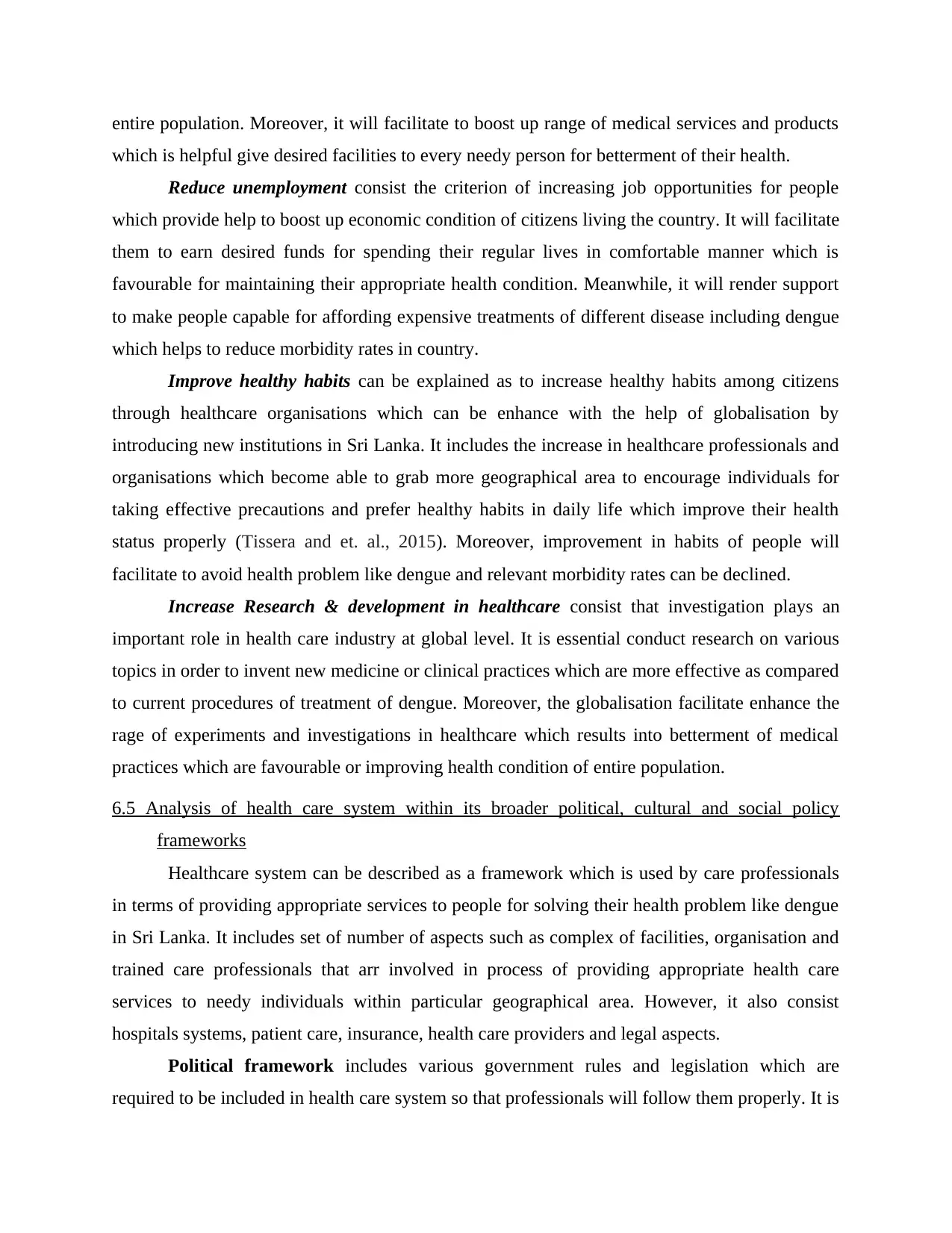
entire population. Moreover, it will facilitate to boost up range of medical services and products
which is helpful give desired facilities to every needy person for betterment of their health.
Reduce unemployment consist the criterion of increasing job opportunities for people
which provide help to boost up economic condition of citizens living the country. It will facilitate
them to earn desired funds for spending their regular lives in comfortable manner which is
favourable for maintaining their appropriate health condition. Meanwhile, it will render support
to make people capable for affording expensive treatments of different disease including dengue
which helps to reduce morbidity rates in country.
Improve healthy habits can be explained as to increase healthy habits among citizens
through healthcare organisations which can be enhance with the help of globalisation by
introducing new institutions in Sri Lanka. It includes the increase in healthcare professionals and
organisations which become able to grab more geographical area to encourage individuals for
taking effective precautions and prefer healthy habits in daily life which improve their health
status properly (Tissera and et. al., 2015). Moreover, improvement in habits of people will
facilitate to avoid health problem like dengue and relevant morbidity rates can be declined.
Increase Research & development in healthcare consist that investigation plays an
important role in health care industry at global level. It is essential conduct research on various
topics in order to invent new medicine or clinical practices which are more effective as compared
to current procedures of treatment of dengue. Moreover, the globalisation facilitate enhance the
rage of experiments and investigations in healthcare which results into betterment of medical
practices which are favourable or improving health condition of entire population.
6.5 Analysis of health care system within its broader political, cultural and social policy
frameworks
Healthcare system can be described as a framework which is used by care professionals
in terms of providing appropriate services to people for solving their health problem like dengue
in Sri Lanka. It includes set of number of aspects such as complex of facilities, organisation and
trained care professionals that arr involved in process of providing appropriate health care
services to needy individuals within particular geographical area. However, it also consist
hospitals systems, patient care, insurance, health care providers and legal aspects.
Political framework includes various government rules and legislation which are
required to be included in health care system so that professionals will follow them properly. It is
which is helpful give desired facilities to every needy person for betterment of their health.
Reduce unemployment consist the criterion of increasing job opportunities for people
which provide help to boost up economic condition of citizens living the country. It will facilitate
them to earn desired funds for spending their regular lives in comfortable manner which is
favourable for maintaining their appropriate health condition. Meanwhile, it will render support
to make people capable for affording expensive treatments of different disease including dengue
which helps to reduce morbidity rates in country.
Improve healthy habits can be explained as to increase healthy habits among citizens
through healthcare organisations which can be enhance with the help of globalisation by
introducing new institutions in Sri Lanka. It includes the increase in healthcare professionals and
organisations which become able to grab more geographical area to encourage individuals for
taking effective precautions and prefer healthy habits in daily life which improve their health
status properly (Tissera and et. al., 2015). Moreover, improvement in habits of people will
facilitate to avoid health problem like dengue and relevant morbidity rates can be declined.
Increase Research & development in healthcare consist that investigation plays an
important role in health care industry at global level. It is essential conduct research on various
topics in order to invent new medicine or clinical practices which are more effective as compared
to current procedures of treatment of dengue. Moreover, the globalisation facilitate enhance the
rage of experiments and investigations in healthcare which results into betterment of medical
practices which are favourable or improving health condition of entire population.
6.5 Analysis of health care system within its broader political, cultural and social policy
frameworks
Healthcare system can be described as a framework which is used by care professionals
in terms of providing appropriate services to people for solving their health problem like dengue
in Sri Lanka. It includes set of number of aspects such as complex of facilities, organisation and
trained care professionals that arr involved in process of providing appropriate health care
services to needy individuals within particular geographical area. However, it also consist
hospitals systems, patient care, insurance, health care providers and legal aspects.
Political framework includes various government rules and legislation which are
required to be included in health care system so that professionals will follow them properly. It is
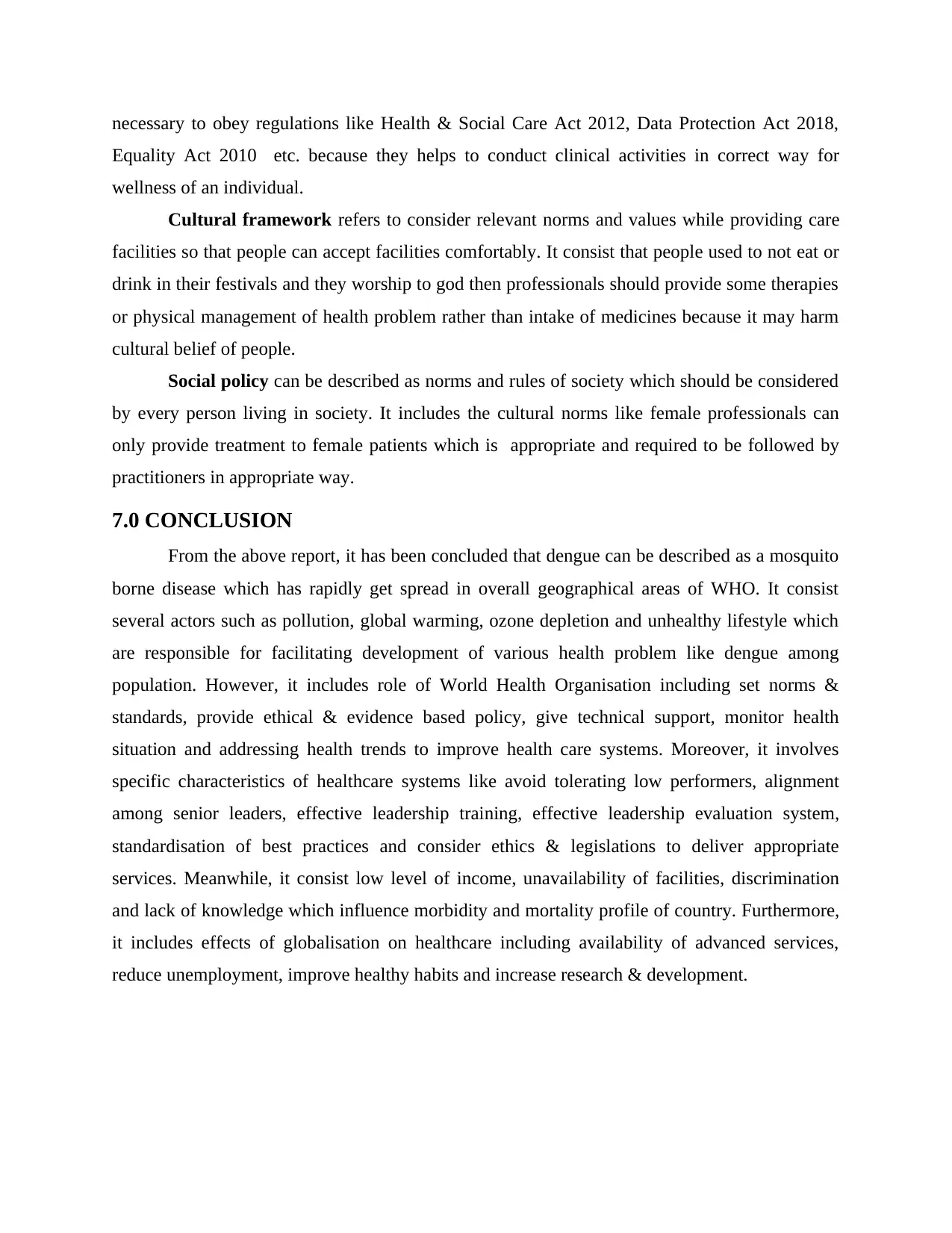
necessary to obey regulations like Health & Social Care Act 2012, Data Protection Act 2018,
Equality Act 2010 etc. because they helps to conduct clinical activities in correct way for
wellness of an individual.
Cultural framework refers to consider relevant norms and values while providing care
facilities so that people can accept facilities comfortably. It consist that people used to not eat or
drink in their festivals and they worship to god then professionals should provide some therapies
or physical management of health problem rather than intake of medicines because it may harm
cultural belief of people.
Social policy can be described as norms and rules of society which should be considered
by every person living in society. It includes the cultural norms like female professionals can
only provide treatment to female patients which is appropriate and required to be followed by
practitioners in appropriate way.
7.0 CONCLUSION
From the above report, it has been concluded that dengue can be described as a mosquito
borne disease which has rapidly get spread in overall geographical areas of WHO. It consist
several actors such as pollution, global warming, ozone depletion and unhealthy lifestyle which
are responsible for facilitating development of various health problem like dengue among
population. However, it includes role of World Health Organisation including set norms &
standards, provide ethical & evidence based policy, give technical support, monitor health
situation and addressing health trends to improve health care systems. Moreover, it involves
specific characteristics of healthcare systems like avoid tolerating low performers, alignment
among senior leaders, effective leadership training, effective leadership evaluation system,
standardisation of best practices and consider ethics & legislations to deliver appropriate
services. Meanwhile, it consist low level of income, unavailability of facilities, discrimination
and lack of knowledge which influence morbidity and mortality profile of country. Furthermore,
it includes effects of globalisation on healthcare including availability of advanced services,
reduce unemployment, improve healthy habits and increase research & development.
Equality Act 2010 etc. because they helps to conduct clinical activities in correct way for
wellness of an individual.
Cultural framework refers to consider relevant norms and values while providing care
facilities so that people can accept facilities comfortably. It consist that people used to not eat or
drink in their festivals and they worship to god then professionals should provide some therapies
or physical management of health problem rather than intake of medicines because it may harm
cultural belief of people.
Social policy can be described as norms and rules of society which should be considered
by every person living in society. It includes the cultural norms like female professionals can
only provide treatment to female patients which is appropriate and required to be followed by
practitioners in appropriate way.
7.0 CONCLUSION
From the above report, it has been concluded that dengue can be described as a mosquito
borne disease which has rapidly get spread in overall geographical areas of WHO. It consist
several actors such as pollution, global warming, ozone depletion and unhealthy lifestyle which
are responsible for facilitating development of various health problem like dengue among
population. However, it includes role of World Health Organisation including set norms &
standards, provide ethical & evidence based policy, give technical support, monitor health
situation and addressing health trends to improve health care systems. Moreover, it involves
specific characteristics of healthcare systems like avoid tolerating low performers, alignment
among senior leaders, effective leadership training, effective leadership evaluation system,
standardisation of best practices and consider ethics & legislations to deliver appropriate
services. Meanwhile, it consist low level of income, unavailability of facilities, discrimination
and lack of knowledge which influence morbidity and mortality profile of country. Furthermore,
it includes effects of globalisation on healthcare including availability of advanced services,
reduce unemployment, improve healthy habits and increase research & development.
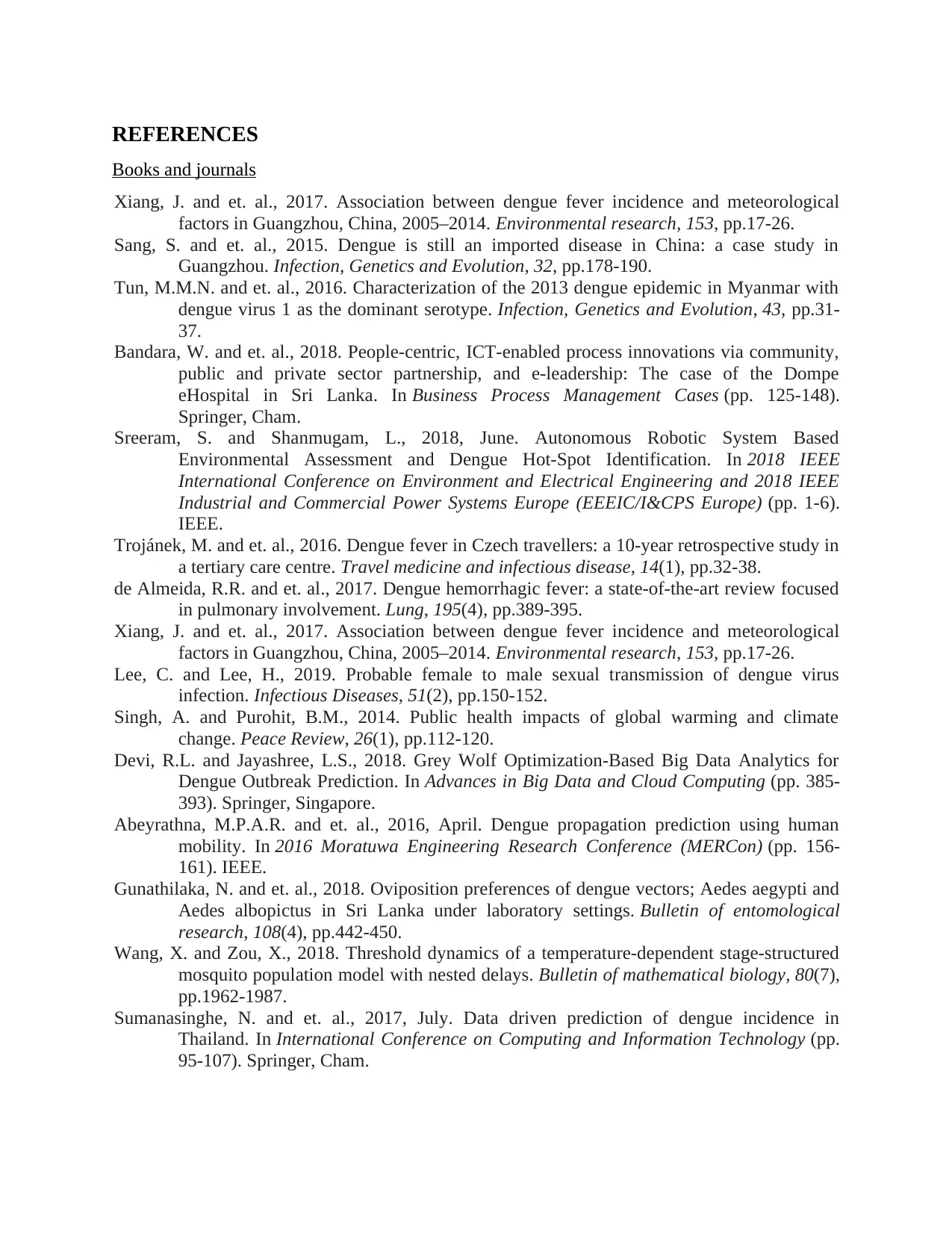
REFERENCES
Books and journals
Xiang, J. and et. al., 2017. Association between dengue fever incidence and meteorological
factors in Guangzhou, China, 2005–2014. Environmental research, 153, pp.17-26.
Sang, S. and et. al., 2015. Dengue is still an imported disease in China: a case study in
Guangzhou. Infection, Genetics and Evolution, 32, pp.178-190.
Tun, M.M.N. and et. al., 2016. Characterization of the 2013 dengue epidemic in Myanmar with
dengue virus 1 as the dominant serotype. Infection, Genetics and Evolution, 43, pp.31-
37.
Bandara, W. and et. al., 2018. People-centric, ICT-enabled process innovations via community,
public and private sector partnership, and e-leadership: The case of the Dompe
eHospital in Sri Lanka. In Business Process Management Cases (pp. 125-148).
Springer, Cham.
Sreeram, S. and Shanmugam, L., 2018, June. Autonomous Robotic System Based
Environmental Assessment and Dengue Hot-Spot Identification. In 2018 IEEE
International Conference on Environment and Electrical Engineering and 2018 IEEE
Industrial and Commercial Power Systems Europe (EEEIC/I&CPS Europe) (pp. 1-6).
IEEE.
Trojánek, M. and et. al., 2016. Dengue fever in Czech travellers: a 10-year retrospective study in
a tertiary care centre. Travel medicine and infectious disease, 14(1), pp.32-38.
de Almeida, R.R. and et. al., 2017. Dengue hemorrhagic fever: a state-of-the-art review focused
in pulmonary involvement. Lung, 195(4), pp.389-395.
Xiang, J. and et. al., 2017. Association between dengue fever incidence and meteorological
factors in Guangzhou, China, 2005–2014. Environmental research, 153, pp.17-26.
Lee, C. and Lee, H., 2019. Probable female to male sexual transmission of dengue virus
infection. Infectious Diseases, 51(2), pp.150-152.
Singh, A. and Purohit, B.M., 2014. Public health impacts of global warming and climate
change. Peace Review, 26(1), pp.112-120.
Devi, R.L. and Jayashree, L.S., 2018. Grey Wolf Optimization-Based Big Data Analytics for
Dengue Outbreak Prediction. In Advances in Big Data and Cloud Computing (pp. 385-
393). Springer, Singapore.
Abeyrathna, M.P.A.R. and et. al., 2016, April. Dengue propagation prediction using human
mobility. In 2016 Moratuwa Engineering Research Conference (MERCon) (pp. 156-
161). IEEE.
Gunathilaka, N. and et. al., 2018. Oviposition preferences of dengue vectors; Aedes aegypti and
Aedes albopictus in Sri Lanka under laboratory settings. Bulletin of entomological
research, 108(4), pp.442-450.
Wang, X. and Zou, X., 2018. Threshold dynamics of a temperature-dependent stage-structured
mosquito population model with nested delays. Bulletin of mathematical biology, 80(7),
pp.1962-1987.
Sumanasinghe, N. and et. al., 2017, July. Data driven prediction of dengue incidence in
Thailand. In International Conference on Computing and Information Technology (pp.
95-107). Springer, Cham.
Books and journals
Xiang, J. and et. al., 2017. Association between dengue fever incidence and meteorological
factors in Guangzhou, China, 2005–2014. Environmental research, 153, pp.17-26.
Sang, S. and et. al., 2015. Dengue is still an imported disease in China: a case study in
Guangzhou. Infection, Genetics and Evolution, 32, pp.178-190.
Tun, M.M.N. and et. al., 2016. Characterization of the 2013 dengue epidemic in Myanmar with
dengue virus 1 as the dominant serotype. Infection, Genetics and Evolution, 43, pp.31-
37.
Bandara, W. and et. al., 2018. People-centric, ICT-enabled process innovations via community,
public and private sector partnership, and e-leadership: The case of the Dompe
eHospital in Sri Lanka. In Business Process Management Cases (pp. 125-148).
Springer, Cham.
Sreeram, S. and Shanmugam, L., 2018, June. Autonomous Robotic System Based
Environmental Assessment and Dengue Hot-Spot Identification. In 2018 IEEE
International Conference on Environment and Electrical Engineering and 2018 IEEE
Industrial and Commercial Power Systems Europe (EEEIC/I&CPS Europe) (pp. 1-6).
IEEE.
Trojánek, M. and et. al., 2016. Dengue fever in Czech travellers: a 10-year retrospective study in
a tertiary care centre. Travel medicine and infectious disease, 14(1), pp.32-38.
de Almeida, R.R. and et. al., 2017. Dengue hemorrhagic fever: a state-of-the-art review focused
in pulmonary involvement. Lung, 195(4), pp.389-395.
Xiang, J. and et. al., 2017. Association between dengue fever incidence and meteorological
factors in Guangzhou, China, 2005–2014. Environmental research, 153, pp.17-26.
Lee, C. and Lee, H., 2019. Probable female to male sexual transmission of dengue virus
infection. Infectious Diseases, 51(2), pp.150-152.
Singh, A. and Purohit, B.M., 2014. Public health impacts of global warming and climate
change. Peace Review, 26(1), pp.112-120.
Devi, R.L. and Jayashree, L.S., 2018. Grey Wolf Optimization-Based Big Data Analytics for
Dengue Outbreak Prediction. In Advances in Big Data and Cloud Computing (pp. 385-
393). Springer, Singapore.
Abeyrathna, M.P.A.R. and et. al., 2016, April. Dengue propagation prediction using human
mobility. In 2016 Moratuwa Engineering Research Conference (MERCon) (pp. 156-
161). IEEE.
Gunathilaka, N. and et. al., 2018. Oviposition preferences of dengue vectors; Aedes aegypti and
Aedes albopictus in Sri Lanka under laboratory settings. Bulletin of entomological
research, 108(4), pp.442-450.
Wang, X. and Zou, X., 2018. Threshold dynamics of a temperature-dependent stage-structured
mosquito population model with nested delays. Bulletin of mathematical biology, 80(7),
pp.1962-1987.
Sumanasinghe, N. and et. al., 2017, July. Data driven prediction of dengue incidence in
Thailand. In International Conference on Computing and Information Technology (pp.
95-107). Springer, Cham.
Secure Best Marks with AI Grader
Need help grading? Try our AI Grader for instant feedback on your assignments.
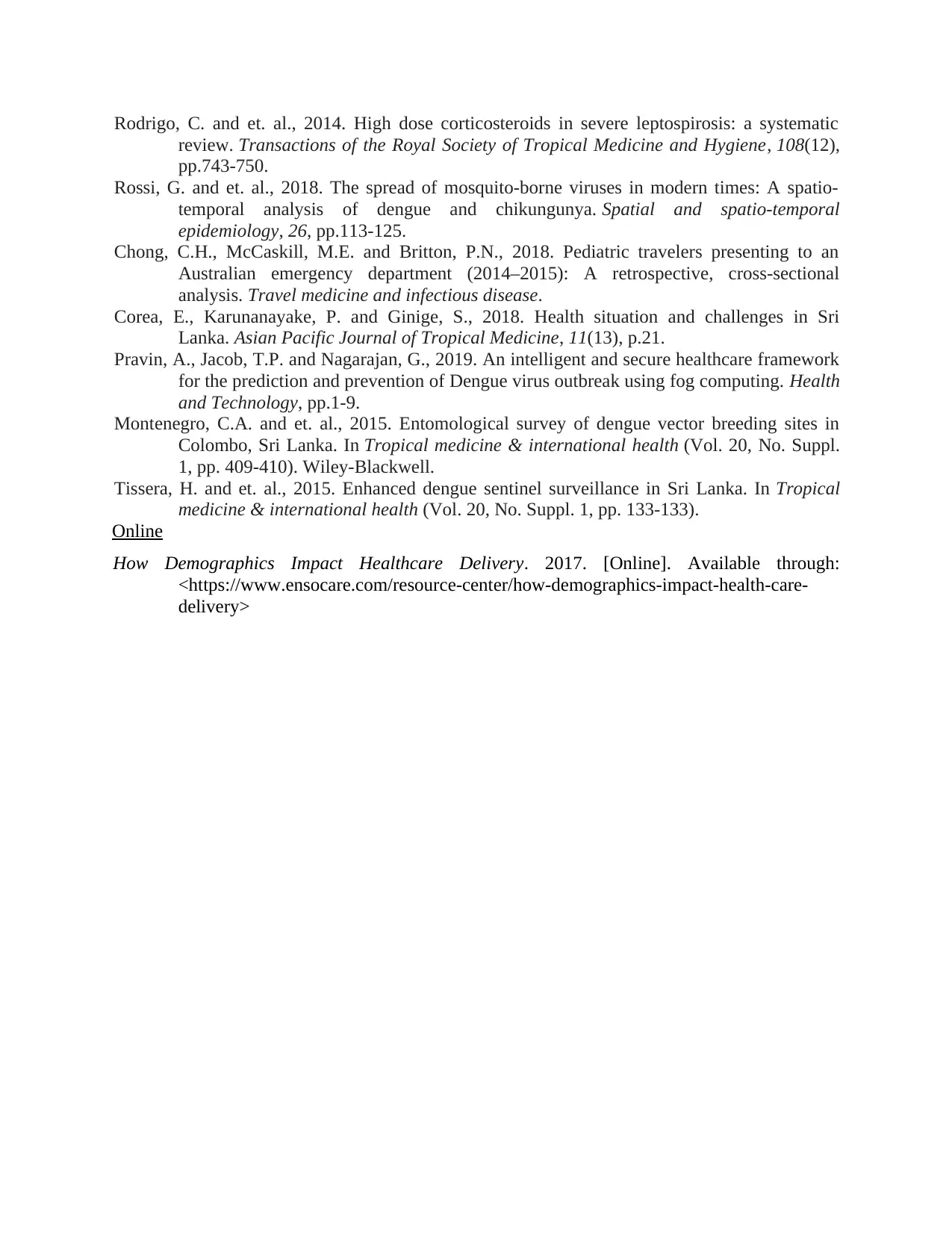
Rodrigo, C. and et. al., 2014. High dose corticosteroids in severe leptospirosis: a systematic
review. Transactions of the Royal Society of Tropical Medicine and Hygiene, 108(12),
pp.743-750.
Rossi, G. and et. al., 2018. The spread of mosquito-borne viruses in modern times: A spatio-
temporal analysis of dengue and chikungunya. Spatial and spatio-temporal
epidemiology, 26, pp.113-125.
Chong, C.H., McCaskill, M.E. and Britton, P.N., 2018. Pediatric travelers presenting to an
Australian emergency department (2014–2015): A retrospective, cross-sectional
analysis. Travel medicine and infectious disease.
Corea, E., Karunanayake, P. and Ginige, S., 2018. Health situation and challenges in Sri
Lanka. Asian Pacific Journal of Tropical Medicine, 11(13), p.21.
Pravin, A., Jacob, T.P. and Nagarajan, G., 2019. An intelligent and secure healthcare framework
for the prediction and prevention of Dengue virus outbreak using fog computing. Health
and Technology, pp.1-9.
Montenegro, C.A. and et. al., 2015. Entomological survey of dengue vector breeding sites in
Colombo, Sri Lanka. In Tropical medicine & international health (Vol. 20, No. Suppl.
1, pp. 409-410). Wiley-Blackwell.
Tissera, H. and et. al., 2015. Enhanced dengue sentinel surveillance in Sri Lanka. In Tropical
medicine & international health (Vol. 20, No. Suppl. 1, pp. 133-133).
Online
How Demographics Impact Healthcare Delivery. 2017. [Online]. Available through:
<https://www.ensocare.com/resource-center/how-demographics-impact-health-care-
delivery>
review. Transactions of the Royal Society of Tropical Medicine and Hygiene, 108(12),
pp.743-750.
Rossi, G. and et. al., 2018. The spread of mosquito-borne viruses in modern times: A spatio-
temporal analysis of dengue and chikungunya. Spatial and spatio-temporal
epidemiology, 26, pp.113-125.
Chong, C.H., McCaskill, M.E. and Britton, P.N., 2018. Pediatric travelers presenting to an
Australian emergency department (2014–2015): A retrospective, cross-sectional
analysis. Travel medicine and infectious disease.
Corea, E., Karunanayake, P. and Ginige, S., 2018. Health situation and challenges in Sri
Lanka. Asian Pacific Journal of Tropical Medicine, 11(13), p.21.
Pravin, A., Jacob, T.P. and Nagarajan, G., 2019. An intelligent and secure healthcare framework
for the prediction and prevention of Dengue virus outbreak using fog computing. Health
and Technology, pp.1-9.
Montenegro, C.A. and et. al., 2015. Entomological survey of dengue vector breeding sites in
Colombo, Sri Lanka. In Tropical medicine & international health (Vol. 20, No. Suppl.
1, pp. 409-410). Wiley-Blackwell.
Tissera, H. and et. al., 2015. Enhanced dengue sentinel surveillance in Sri Lanka. In Tropical
medicine & international health (Vol. 20, No. Suppl. 1, pp. 133-133).
Online
How Demographics Impact Healthcare Delivery. 2017. [Online]. Available through:
<https://www.ensocare.com/resource-center/how-demographics-impact-health-care-
delivery>
1 out of 17
Your All-in-One AI-Powered Toolkit for Academic Success.
+13062052269
info@desklib.com
Available 24*7 on WhatsApp / Email
![[object Object]](/_next/static/media/star-bottom.7253800d.svg)
Unlock your academic potential
© 2024 | Zucol Services PVT LTD | All rights reserved.